#idmon son of Apollo
Explore tagged Tumblr posts
Text

The argonauts are fightingggg and they haven't even set off yet!
"So he spoke, but Idas son of Aphareus burst into laughter and with scorn in his eyes he replied abusively:
'Come now! Tell me this through your prophetic skill: will the gods destroy me in the way your father bestowed the destruction upon the Aloiadai? Take thought for how you will escape my hands if you are found to have uttered empty prophecies!'
So he attacked him angrily and the quarrel would have gone further had not the son of Aison himself restrained their dispute with words of rebuke. Moreover Orpheus took up his lyre in his left hand and began to sing.
- Jason and the Golden Fleece, Book 1 lines 486-494, Apollonius of Rhodes as Translated by Richard Hunter.
Idas really said chat shit get hit. Atalanta is not present in this translation but I simply want her there.
#jason and the argonauts#tagamemnon#greek mythology#classics#ancient greek mythology#greek heroes#jason and the golden fleece#jason son of aeson#peleus#the argonautica#the argonauts#Atalanta#Orpheus#hercules#herakles#idas#idmon#idmon son of Apollo#apollo#argonauts#so many prophets on the argo#and they still forget hercules
133 notes
·
View notes
Text
Writing Apollo-as-a-young-deity is fun because sometimes it involves completely making shit up based on the loose outline of a story told through old poems, prayers and plays and other times it involves researching the totally legit and well documented ancient art of studying sheep livers to make sure your statesmen don't accidentally piss off Jupiter.
In completely unrelated news, if anyone has any recommendations for books about bird augury, that'd be wonderful.
#ginger rambles#ginger chats about greek myths#apollo#part of why the next part of manent is taking so long is because traditional greek divination is an incredibly involved process#with many sub-arts and studies that all have their own variations developments and places in terms of usage and context#Apollo's sons especially the ones who were skilled seers often had their specific specialty of divination stated/which divination skills#Papapollo passed on to them#Idmon was great with entrail divination apparently#and Iamus was taught bird augury - specifically how to listen to their calls and predict the future from their flight patterns#Calchas the diviner in the Iliad? He was also a bird diviner#Really interesting stuff that's severely underutilised when it comes to portraying stories dealing with prophecy and Apollo#They were skills to be mastered y'all not magic#Anyway save me George Sarton wah wah wah#I absolutely should be sleeping LMFAO
224 notes
·
View notes
Text
Statistics of Apollo's Lovers
I was wondering just how unfortunate of a love-life our boy Apollo had, so - as one does - I did the research, math, and writing of said love-life.
such is the life of an adhd teen :)
In total, there are 63 people on this list. I have them separated into eight groups; Immortal, Immortal & Rejected, Lived, Died, Rejected & Died, Rejected & Cursed, Rejected & Lived, and who were Rejected by Apollo
Disclaimer: I am not a historian nor an expert in Greek Mythology, I am just a very invested nerd in Mythology, and in Apollo's mythology in general, and got curious about what his rap sheet actually looks like.
Sidenote: There will be some "lovers" not on this list. Reasons being;
No actual literary sources behind them
Said literary sources are dubious at best
Not enough information is given about the nature of their relationship to make an accurate take
So if somebody isn't on this list, it's because of one of those three reasons. Although there is still a chance I missed somebody! :)
Also, no RRverse lovers include in this list. Sorry my fellow ToA fans.
(Edited 04/05/25 - ALL SECTIONS SOURCED)
Let's begin! :D
Immortal Lovers
Calliope: muse of epic poetry. Mother of Hymenaios and Ialemus (Pindar's 3rd Threnos) by Apollo.
Clio: muse of history
Erato: muse of love poetry
Euterpe: muse of music
Polyhymnia: muse of hymns/sacred poetry
Melpomene: muse of tragedy
Thalia: muse of comedy. Mother of the Corybantes (The Bibliotheca by Pseudo-Apollodorus) by Apollo.
Terpsichore: muse of dance
Urania: muse of astronomy
Boreas: the North Wind. The Boreads called Apollo "beloved of our sire" in Apollonius of Rhodes's Argonautica.
Rhetia: alternate mother of the Corybantes by Apollo. (Strabo's Geography 10.3.21)
11 lovers total here.
10 Female, 1 Male
Immortal & Rejected
Hestia: goddess of the Hearth (Hymn to Aphrodite)
1 Interest. Female.
Lovers Who Lived:
Branchus: mortal shepherd, gifted prophecy (Conon's Narrations 33 & Callimachus's Iambus)
Rhoeo: mortal princess, eventually married an apprentice of Apollo (Diodorus Siculus's Bibliotheca historica 5.62 and Tzetzes on Lycophron 570)
Ourea: demigod daughter of Poseidon, dated Apollo during his punishment with Laomedon; had a son named Ileus, after the city of Troy (Hesiod's Catalogues of Women Fragment 83)
Evadne: nymph daughter of Poseidon, Apollo sent Eileithyia & (in some texts) the Fates to aid in their son's birth (Pindar's Olympian Ode 6)
Thero: great-granddaughter of Heracles, described as "beautiful as moonbeams" (Pausanias's Description of Greece 9)
Cyrene: mortal princess-turned-nymph queen, kick-ass lion wrangler, and mother of two of Apollo's sons - Aristaeus (a god) and Idmon (powerful seer) (Pindar's Pythian Ode 9.6 ff. and Nonnus's Dionysiaca and Callimachus's Hymn to Apollo 85)
Admetus: mortal king, took great care of Apollo during his second punishment, Apollo wingmanned him for Alcestis's hand - basically Apollo doted on him <3 (Callimachus's Hymn II to Apollo and Apollodorus's Bibliotheca 1.9.15 and Hyginus's Fabulae 50–51, and also written about by Ovid and Servius)
Hecuba: queen of Troy, together they had Troilus.
It was foretold that if Troilus lived to adulthood, Troy wouldn't fall - unfortunately, Achilles murdered Troilus in Apollo's temple. When the Achaeans burned Troy down, Apollo rescued Hecuba and brought her to safety in Lycia. (Stesichorus's Fr.108)
Hyrie/Thyrie: mortal. mothered a son by Apollo. Their son, Cycnus, attempted to kill himself after some shenanigans and his mother attempted the same. Apollo turned them into swans to save their lives. (Antoninus Liberalis's Metamorphoses 12 and Ovid's Metamorphoses 7.350)
Dryope: mortal. had a son named Amphissus with Apollo, who was a snake at the time. Later turned into a lotus flower, but it had nothing to do with Apollo so she's still on this list. (noncon; written by Ovid in Metamorphoses 8 CE/AD and later by Antoninus Liberalis in his own Metamorphoses sometime between 100-300 CE/AD)
Creusa: mortal queen. had a son named Ion with Apollo (Euripides's Ion). Please check out @my-name-is-apollo's post for more details because they make some good points about what's considered "rape" in Ancient Greece. I expand on this further at the end of the post.
Melia: Oceanid nymph. Had a son w/h Apollo named Tenerus. (Pausanias's Descriptions of Greece 9.10.5–6)
Melia was said to be kidnapped, and her brother found her with Apollo. He set fire to Apollo's temple in an effort to get her back, but was killed. Melia and Apollo had two kids - but here's the interesting part. Melia was highly worshiped in Thebes, where her brother found her. She was an incredibly important figure in Thebes, especially when connected with Apollo. She and Apollo were essentially the parents of Thebes.
As I read over their story, it sounded like (to me, at least. it's okay if you think otherwise!) that Melia just absconded/eloped with Apollo.
Was kidnapping an equivalent to assault back then? Perhaps. But it's still debated on whenever or not that's true. However, one thing I've noticed reading up on these myths is that when Apollo does do something unsavory, the text says so.
It never says anything about Apollo doing anything to Melia. Her father and brother believe she was kidnapped, but, like mentioned previously, it seems far much more likely that she just ran off with her boyfriend or something.
But that's just my interpretation.
Moving on! :)
Iapis: a favorite lover. Apollo wanted to teach him prophecy, the lyre, ect. but Iapis just wanted to heal :) so Apollo taught him healing :) (Smith 1873, s.v. Iapis)
Aethusa: daughter of Poseidon & the Pleiad Alcyone. Mother of Linus and Eleuther. She is the great-great grandmother of Orpheus. (Apollodorus's Bibliotheca 3.10.1 and Pausanias's Descriptions of Greece 9.20.2 and Suida, s.v. Homer's Of the Origin of Homer and Hesiod and their Contest, Fragment 1.314)
Acacallis: daughter of King Minos. there's a lot of variation on whether or not she had kids with Hermes or Apollo. Some say she had a kid with each. (Stephanus of Byzantium, s.v. Kydōnia (Κυδωνία and Scholia on Apollonius Rhodius, 4.1492)
Chrysothemis: nymph queen who won the oldest contest of the Pythian Games - the singing of a hymn to Apollo. She had three daughters, and one of them is said to be Apollo's. (Pausanias's Descriptions of Greece 10.7.2 and Hyginus's De Astronomica 2.25)
Corycia: naiad. had a son with Apollo. the Corycian Cave north of Delphi is named after her (Hyginus's Fabulae 161)
Leuconoe (also Choine or Philonis): daughter of Eosphorus, god of the planet Venus, and mother of the bard Philammon. (Hyginus's Fabulae 161) She was killed by Diana for her hubris.
Melaena (also Thyia or Kelaino): mother of Delphos, member of prophetic Thriae of Delphi. Priestess of Dionysus. (Herodotus's Histories 7.178.1)
Othreis: mothered Phager by Apollo, and later Meliteus by Zeus. (Antoninus Liberalis's Metamorphoses 13)
Stilbe: mother of Lapithus and Aineus by Apollo. (Diodorus Siculus's Library of History 4.69.1 and Scholia on Apollonius Rhodius, 1.40 and Scholia on Apollonius Rhodius, 1.948)
Syllis (possible same as Hyllis, granddaughter of Heracles): mothered Zeuxippus by Apollo. (Pausanias's Descriptions of Greece 2.6.7)
Amphissa: Apollo seduced her in the form of a shepherd. They had a son named Agreus. (Ovid's Metamorphoses 6.103 and Hyginus's Fabulae 161)
(hey, has anybody else noticed that 'Apollo disguising himself' seems to only be a thing in Roman literature?)
Areia (or Deione): had a son named Miletus. Hid him in some smilax. Her father found him and named him. (Apollodorus's Bibliotheca 3.1.2)
Arsinoe: she and Apollo had a daughter named Eriopis. (Hesiod's Ehoiai 63 and Scholia ad Pindar's Pythian Ode 3.14)
Queen of Orkhomenos (no name is given): Mother of Trophonius (Pausanias's Descriptions of Greece 9.37.5)
(my fellow ToA fans will recognize that name haha).
Hypermnestra: Either Apollo or her husband fathered her son Amphiaraus. (Hyginus's Fabulae 70)
(sidenote: @literallyjusttoa suggested that Apollo was dating both Hypermnestra and Oikles, and I, personally, like that headcannon)
Manto: Daughter of Tiresias. Apollo made her a priestess of Delphi. They had a son named Mopsus. When Apollo sent her to found an oracle elsewhere, he told her to marry the first man she saw outside of Delphi. That man turned out to be Rhacius, who brought her to Claros, where she founded the oracle of Apollo Clarios. (Apollodorus's Bibliotheca E6. 3)
Later, another man named Lampus attempted to assault her, but was killed by Apollo. She is also said to be a priestess who warned Niobe not to insult Leto, and to ask for forgiveness. Niobe did not. (Statius's Thebaid 7 and Ovid's Metamorphoses 6)
(Dante's Inferno places her in the eighth circle of hell, and let me just say- what the FUCK Dante! What did Manto ever do to you, huh??!! Don't do my girl dirty!!)
Parthenope: granddaughter of a river god. Mothered Lycomedes by Apollo (Pausanius's Descriptions of Greece 4.1)
Phthia: prophetess. called "beloved of Apollo". Mother three kings by him; Dorus, Laodocus, & Polypoetes (Apollodorus's Bibliotheca 1.7.6)
Procleia: Mother of Tenes, son of Apollo, who was killed by Achilles before the Trojan War. Daughter of King Laomedon, king of Troy. (Apollodorus's Epitome 3. 26)
Helenus: prince of Troy. Received from Apollo an ivory bow which he used to wound Achilles in the hand. (Photius's 'Bibliotheca excerpts')
Hippolytus of Sicyon: called "beloved of Apollo" in Plutarch's Life of Numa. I don't think this guy is the same as Hippolytus, son of Zeuxippus (son of Apollo), king of Sicyon Pausanias talks about in his Description of Greece. That would be a little weird taking the whole family tree into account - though it's never stopped other gods before. *shrug*
Psamathe: nereid, said to be the personification of the sand of the sea-shore. (Conon's Narrationes 19)
She and Apollo were lovers, but never had any kids. When another man assaulted her, she had a son and abandoned him.
(He was found by some shepherds dw - wait, he was then torn apart by dogs. Nevermind.)
Back to her, her father ordered for her to be executed and Apollo avenged her death by sending a plague onto Argos and refused to stop it until Psamathe and Phocus/Linus (her son) were properly given honors.
(I really like how even though Linus isn't Apollo's kid, and that Psamathe wanted nothing to do with the kid, Apollo still considered him worth avenging too <3 )
Okay, in a previous incarnation of this post, I said there was a version where she is raped by Apollo...however, I can't find any sources to back it up😅 Even her wiki page doesn't mention rape, and Theoi's excerpt of Paunasias's Descriptions of Greece about her doesn't either.
So where did I hear about this supposed version? (Don't shoot)
Youtube. A youtube video about Apollo. Yeah...
Lesson, kids! Don't trust youtube videos on mythology! Yes, even if they dedicated lots of time to it! They can still get things wrong! In fact, don't even take my word for it! Do your own research <3
Hymenaeus: No, not his kid. This is a different Hymenaeus haha! This Hymenaeus is the son of Magnes, and comes from Megalai Ehoiai fr. 16, commonly attributed to Hesiod, and Antonius Liberalis's Metamorphosis. Legend states that while Apollo was preoccupied with Hymenaeus, baby Hermes stole his cows ;)
Euboia: Daughter of Macareus. Bore a son named Agreus. (Hyginus's Fabulae 161)
Philodice: Wife of Leukippos, mothered Phoebe and Hilaera by Apollo (Descriptions of Greece 3.16.1, citing the Kypria).
Alright. 37 lovers here.
6 Male. 31 Female.
35 are 100% consensual. Creusa is questionable, depending on who's translating/which tradition you go with. Dryope is noncon.
Lovers Who Died:
Hyacinthus*: mortal prince. we all know this one, right? Right? one and only true love turned into flower (okay that's my bias speaking but AM I WRONG?) (Plutarch's Life of Numa, 4.5; Philostratus the younger's Imagines; Pseudo-Apollodorus's Bibliotheca 1.3.3; Ovid's Metamorphoses 10.162–219; Bion's Poems 11; and various pieces of art)
Cyparissus: mortal. his DEER DIED and he asked Apollo to let him MOURN FOREVER so he was turned into a cypress tree (Ovid's Metamorphoses X 106ff)
Coronis: mortal princess. cheated on Apollo w/h Ischys, who in Fabulae was killed by Zeus. mother of Asclepius. killed by Artemis. (Pindar's Pythian Odes 3.5; Pausanias's Descriptions of Greece 2.26.6; Hyginus's Fabulae 202; Ovid's Metamorphoses 2.536 and 2.596; Hyginus's De Astronomica 2.40; Isyllus's Hymn to Asclepius 128.37 ff.)
There is another version of Asclepius's birth given by Pausanias in Descriptions of Greece 2.26.1-7, where Coronis exposes him on a mountain and Apollo takes him in.
Adonis: yes, THAT Adonis. he's in this category because. well. he died. rip (Ptolemy Hephaestion's New History Book 5)
Phorbas: Okay so Apollo's lover Phorbas and another Phorbas sometimes get mashed together so this is what I was able to gather.
Plutarch's Life of Numa 4.5 and Hyginus's De Astronomia 2.14.5 cites Phorbas as Apollo's lover. The other Phorbas is said to be a rival to Apollo in the Homeric Hymn to Apollo. Personally, I separate the two because it makes more sense with Phorbas the lover's overall story.
Here it is: The island of Rhodes fell victim to a plague of dragons or serpents, and the oracle said to summon Phorbas for help. He defeated the infestation, and after he died, Apollo asked Zeus to place him in the stars, and so Phorbas became the constellation Serpentarius, also known more widely as Ophiuchus (a man holding a serpent).
FORGET ORION AND HIS ONE-OFF MENTION OF BEING DIANA'S LOVER HERE IS A CONSTELLATION TRAGIC LOVE STORY!!!!!
(*Hyacinthus was resurrected, as celebrated in the Hyacinthia festival in Sparta. Nonnus's Dionysiaca 19.102 and Pausanias's Descriptions of Greece 3.19.4 supports this belief as well.)
5 lovers.
4 Male. 1 Female. All consensual.
Sidenote: QUIT BURYING THE GAYS GREECE!!!!
Love-Interests Who Rejected & Died:
Daphne: do i nEED to say anything? Nymph. turned into tree to escape.
Daphne and Apollo actually go back a bit. Their story was used to explain why the laurel was so sacred to Apollo. It's in Delphi, Branchus planted laurel trees around the temple he built to Apollo, the laurel was even sacred to Apollo's historical forebearer Apulu, an Etruscan god! (I have sources to back this up :3 along with an Essay.)
Apollo & Daphne first originate from Phylarchus, but we do not have any of his work :( It's been lost to history...a moment of silence RIP. He was a contemporary in the 3rd century BC/BCE (first day of 300 BC/BCE and last day of 201 BC/BCE).
He was, however, cited as a source in Parthenius's Erotica Pathemata, written sometime in the 1 century AD/CE (sometime between 66 BC/BCE and the author's death in 14 AD/CE).
Then they show up again in Pausanias's Descriptions of Greece, written between 150 AD/CE and 170 AD/CE.
Hyginus wrote his Fabulae sometime before Ovid's because it's widely criticized to be his earliest work and Ovid wrote his Metamorphoses in 8 AD/CE.
The first two versions are roughly the same, and Ovid's shares similarities with the first in only the ending. Hyginus is basically like Ovid's but without Eros.
So in publication order, it's; Erotica Pathemata, Fabulae, Metamorphoses, then Descrip. of Greece.
In Erotica Pathemata, Daphne is the daughter of Amyclas and is being courted by Leucippus. She is not interested in any sort of romance. Leucippus disguises himself as a girl to get close to her, but his ruse is revealed when Apollo nudges Daphne and her attendants into taking a bath in the river. Leucippus is consequently killed.
Apollo then becomes interested and Daphne runs away, imploring Zeus that "she might be translated away from mortal sight", and is transformed into the laurel tree.
In Fabulae, Daphne's story is a bit more familiar. She's the daughter of Peneus, the river god, and Gaea is the one who transforms her into a laurel tree.
In Metamorphoses, Eros is added to the story and is the reason why Apollo is so enamored and Daphne is so repulsed.
(I would just like to say that in this version, it was 100% nonconsensual for both of them! And I don't mean with rape- Apollo never touches Daphne in any of these version. What I mean here is that Eros maliciously makes Apollo chase down a woman and makes sure Daphne would be repulsed by him. That is noncon behavior there on both sides.)
In Descriptions of Greece 10.7.8, Daphne is the daughter of Ladon and her and Apollo are only connected by way of why the laurel crown is the victory prize of the Pythian Games. However, in Descriptions of Greece 8.20.2-8.20.4, Daphne and Leucippus make an appearance here too, but Apollo is not the reason why they stop to take a swim and his ruse is revealed, resulting in his death.
Castalia: Nymph. turned into spring to escape.
First things first, Castalia was used to explain the existence of the Castalian Spring in Delphi. However, in the Homeric Hymn to Apollo, the spring is already there when Apollo was born. So there's that to consider first.
Anyway, to escape Apollo's advances, Castalia transforms herself into a spring. (Lactantius Placidus's On Statius's Thebaid 1.698. This was written between Lactantius's lifespan of c. 350 – c. 400 AD/CE, placing it firmly in Roman times.)
2 Interests.
2 Female.
Love-Interests Who Rejected & Cursed
Cassandra: mortal princess. Received the gift of prophecy from Apollo. Due to a broken oath, she was then cursed. (Aeschylus's Agamemnon)
It is only in Roman-era tellings where Cassandra is cursed for not sleeping with Apollo, and there was no oath made (Hyginus & Pseudo-Apollodorus). In Agamemnon, it was done so because of the broken oath- not the refusing to sleep with Apollo thing.
The version where she gains prophetic abilities by way of a snake licking her ears is not part of Greco-Roman literature, but rather by an American poet.
Nevertheless, even after the curse Cassandra still loved Apollo, and called him "god most dear to me" in Eurpides's play The Trojan Women.
1 Interests.
1 Female.
Love-Interests Who Rejected & Lived
Sinope: mortal. there are two different version of her myth.
In Diodorus Siculus's Library of History 4.72.2 and Corinna's Frag. 654, Apollo "seizes" her and they have a son named Syrus.
In Apollonius's Argonautica 2.946-951 and Valerius Flaccus's Argonautica 5.109, it is Zeus who abducts her, but she gets him to promise her anything and requests to remain a virgin. He obliges. Later, Apollo and the river Halys both try to charm her, but fall for the same trick.
Library of History was written between 60-30 BC/BCE, Apollonius's Argonautica between 300 BC/BCE and 201 BC/BCE, and Valerius Flaccus's Argonautica between 70-96 AD/CE, making Apollonius's version the oldest and Valerius Flaccus's the youngest.
Marpessa: mortal princess, granddaughter of Ares. Idas, son of Poseidon, kidnapped her and Apollo caught up to them. Zeus had Marpessa chose between them, and she chose Idas, reasoning that she would eventually grow old and Apollo would tire of her. (Homer's The Iliad, 9.557 and Apollodorus's Bibliotheca 1.7.8–9)
Bolina: mortal. Apollo approached her and she flung herself off a cliff. He turned her into a nymph to save her life. (Pausanias's Description of Greece 7.23.4)
Ocroe/Okyrrhoe: nymph and daughter of a river god. asked a boatman to take her home after Apollo approached her. Apollo ended up turning the boat to stone and the seafarer into a fish. (Athenaeus's The Deipnosophists 7.283 E [citing The Founding of Naucratis by Apollonius Rhodius]. The Deipnosophists was written in the early 3rd century AD, between 201 AD and 300 AD)
Sibyl of Cumae: mortal seer. promised to date Apollo if she was given longevity as long as the amount of sand in her hand. he did, but she refused him. (Ovid's Metamorphoses 14)
5 Interests. All female.
Okyrrhoe's story is the only one with any iffy stuff, although, when something iffy does occur, the text usually says so outright.
Rejected by Apollo:
Clytie*: Oceanid nymph. turned into a heliotrope to gaze at the sun forever after the rejection.
1 Advance. Female.
(*Clytie's story was originally about her affection for Helios. [Ovid's Metamorphoses 4.192–270; Ovid used Greek sources about the etymology of the names involved, meaning Clytie and Helios go back to Greek times] As Apollo got superimposed over Helios's myths, people have assumed it is he who is the sun god in her myth and not Helios.)
In Conclusion...
63 people total, and 35 of them have Roman-Era roots with (as far as I know!! Don't take my word as gospel truth!!) no relation to Greece except by way of shared mythology.
Here's the list:
Rhoeo
Thero
Hyrie/Thyrie
Dryope
Melia
Aethusa
Acacallis
Chrysothemis
Corycia
Choine
Thyia
Othreis
Stilbe
Syllis
Amphissa
Areia
Queen of Orkhomenos
Hypermnestra
Manto
Parthenope
Phthia
Procleia
Helenus
Hippolytus of Sicyon
Psamathe
Cyparissus
Adonis
Phorbas
Castalia
Sinope
Bolina
Ocroe/Okyrrhoe
Sibyl of Cumae
Rhetia
Euboia
Meaning, 56% of the lovers listed on this post are not entirely Greek in origin (AS FAR AS I KNOW-)! That does not mean ofc that you have to ignore them. I, for one, really like the story of Rhoeo, and Manto, and Psamethe- I find their myths sweet (Rhoeo & Manto) and bittersweet (Psamethe).
Let's get to the calculations now, yeah?
63 people total (Includes Clytie)
51 Women (81%). 12 Men (19%).
19% were Immortal (Including Lovers & Rejected)
74% Lived (Including Lovers & Cursed & Rejected)
11% Died (Including Lovers & Rejected)
2% were Cursed
2% were Rejected by him
62 people total (Not Including Clytie)
50 Women (81%). 12 Men (19%).
19% were Immortal
69% Lived (Lovers & Cursed & Rejected)
11% Died (Lovers & Rejected)
in that 11%, one was apotheosized - Hyacinthus.
Meaning 9% died permanently, while 2% were resurrected.
2% were Cursed
0% were Rejected by him
Additionally, I left off five male lovers and two female lovers - Atymnius, Leucates, Cinyras, Erginus, Leukippos, Hecate, & Acantha.
Atymnius has no references to being Apollo's lover, only to Zeus's son Sarpedon. (Wikipedia why do you even have him listed? You need sources smh)
Leucates is another male "lover" left off the rack - apparently he jumped off a cliff to avoid Apollo, but I couldn't find any mythological text to account for it- and no, OSP's wiki page is not a reliable source. There is a cliff named similarly to him where Aphrodite went (by Apollo's advice) to rid herself of her longing for Adonis after his death. Also Zeus uses it to rid himself of his love for Hera before he...well, commits adultery again. 🤷
Cinyras was a priest of Aphrodite on the island of Cyprus. He was also the island's king. Pindar calls him "beloved of Apollo" in his Pythian Ode. However, looking further into Cinyras's life throws a bit of a wrench into it. He's also cited to be a challenger to Apollo's skill, and either Apollo or Mars (Ares) kills him for his hubris.
(honestly, I kinda like the idea that Mars went into Big Brother Mode)
I did consider leaving him on the list, since technically you could argue it was a romance-gone-bad, but among every other source Cinyras is mentioned in, Pindar's the only one who puts a romantic label on him and Apollo.
Plus, he’s been described as a son of Apollo too, and I personally like that more lol
Erginus now I only put on here because I saw a tumblr post saying he was a lover of Apollo, but after consulting fellow nerds on the matter we concluded that there is (very likely) no records indicating such. Hence his placement here to curb potential misinformation <3
Leukippos is here for much the same reasons as Erginus. Full disclosure here from fellow nerds but long story short a few of his daughters are said to be Apollo’s by way of his wife, who is on this list (Philodice in the Lived section!)
Hecate, the goddess of magic and crossroads, is said to be the mother of Scylla (like, the sea-monster) by Apollo, but Scylla's parentage is one of those "no specific parents" ones, so I left her off the list.
Acantha has absolutely no classical references. There's a plant like her name, but she's made-up, so she doesn't count. *stink-eyes the guy who invented her and claimed his “sources” were reliable when they really aren’t*
(Of course, I could be wrong about any of these. Again, I'm not an expert.)
With all this in mind, this means Apollo's love life actually isn't as tragic as media portrays it, and he isn't as bad as Zeus or Poseidon in the nonconsensual area.
Does he still have those kinds of myths? Yes, with Dryope and Creusa; though, we can discount Creusa because;
1) Depends on who's translating it; and
2) Ion is given different parentage in the Bibliotheca, which yes, came much after Ion, however Xuthus was traditionally considered to be Ion's father rather than Apollo. This means there was probably a different oral tradition on Ion's parentage that just wasn't written down as early as Euripides's was- in fact, it may even just be an invention of Euripides's.
(and honestly Apollo's characterization in Ion just doesn't quite match up with the rest of his appearances in the wider myths (in my opinion, at least))
So that leaves us with just Dryope, who comes from Ovid, a Roman poet, and Antoninus Liberalis, a late Greek one.
Now I'm not saying we should throw her out because of Ovid's whole "wrote the gods even more terribly to criticize Augustus" thing, but it is something to keep in mind. Political mechanics have been used to change myths before, and this is certainly one example of it.
Additionally, I have seen many people discard Dionysus's rapes in the Dionysiaca because of how late it was written, so this one can be given similar treatment if one choses too because of just how late Ovid and Antoninus Liberalis's work was.
You can, in fact, pick and chose if you wish, especially if it'll increase your enjoyment of literature. That's certainly what I do :)
So overall, I'd say Apollo has a rather clean relationship past. He's doing pretty damn good.
Also, I think we should all take note that even if Apollo had noncon myths, that doesn't reflect on the actual god. The Ancient Greeks did not see the myths as "canon" to their gods- in fact, some were not happy with the myths showing the gods in such a light.
That's something else to keep in mind. The gods of the myths are not the gods of Greece, and are more like parables or fables for the Ancient Greeks I'd say. Lessons on morality and such, and of course, warnings against hubris and the like.
This was quite the journey, and I really hope you all enjoyed reading and learning with me! This really makes me wonder- if Apollo's love life is this good, I wonder how misinformed we are on everyone else's? I have no plans on doing Zeus or Poseidon or anyone else (not for a LONG time lol, this took a lot of effort and research!), but if anyone has any idea, or gets inspired to do something like this for any other god, please tag me!! I'd love to see it! :D
And since this was on a previous reblog, here be a meme from a while ago:
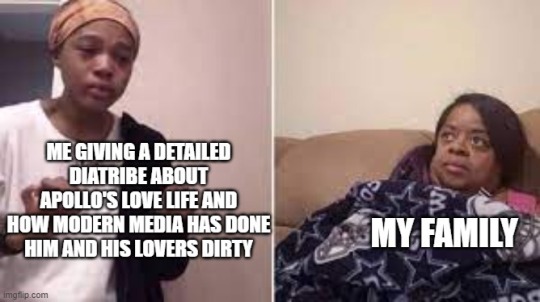
[ID: Me Explaining Me. On the left is a girl with her hands up, fingers pinched together, like she's intensely explaining something. The text over her says "Me giving a detailed diatribe about Apollo's love life and how modern media has done him and his lovers dirty". On the right is the girl's mother, wrapped up to her chin in a blanket, with a look on her face that screams "absolutely done with this shit". The Mother is labeled "My family". /End ID]
suffers in I'm the only mythology nerd in the family
#ramblings of an oracle#greek mythology analysis#apollo#greek myths#greek gods#greek myth#ancient greece#still gonna tag this as toa#just because#;)#the trials of apollo#toa#trials of apollo#tagamemnon#greek history#ancient greek#greek mythology#greek tumblr#ancient rome#ancient history#rome#greece#apollon#apollo deity#hyacinthus#hyacinth#apollo x hyacinthus#apollo and hyacinthus#cassandra of troy#the muses
1K notes
·
View notes
Text
Twitter Profiles Part 3: Gods Edition
Apollo, Asclepius, Aristaeus, Hymenaios, Ialemus, Chariklo, Cephisso, Apollonis, Borysthenis, and the The Samothrakian Korybantes
Note: A lot of Apollo's godly children are disputed. Like, so many. So, I used my own judgement to choose who to pick. After the profiles I will give a brief description of everyone's domains, plus their other parent, with some extra notes from me.
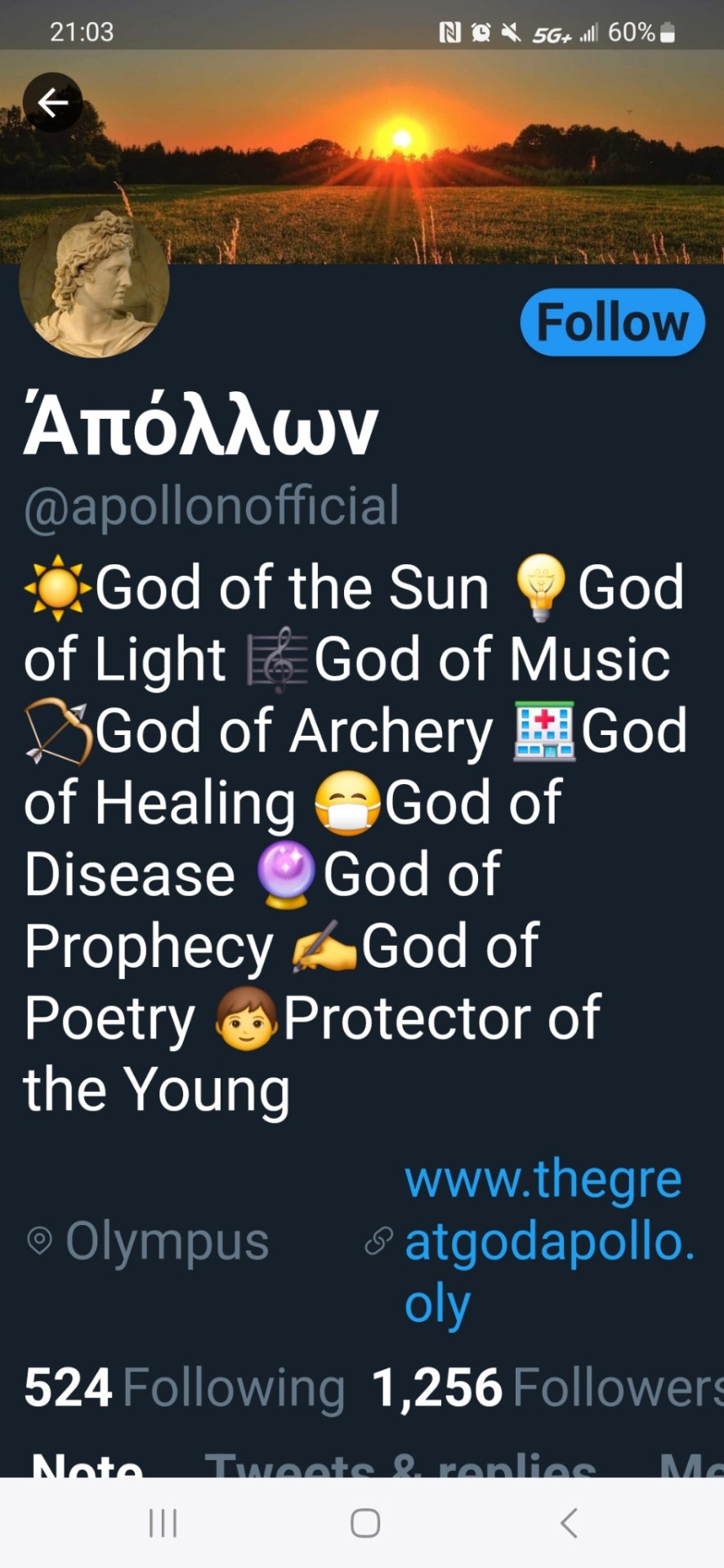
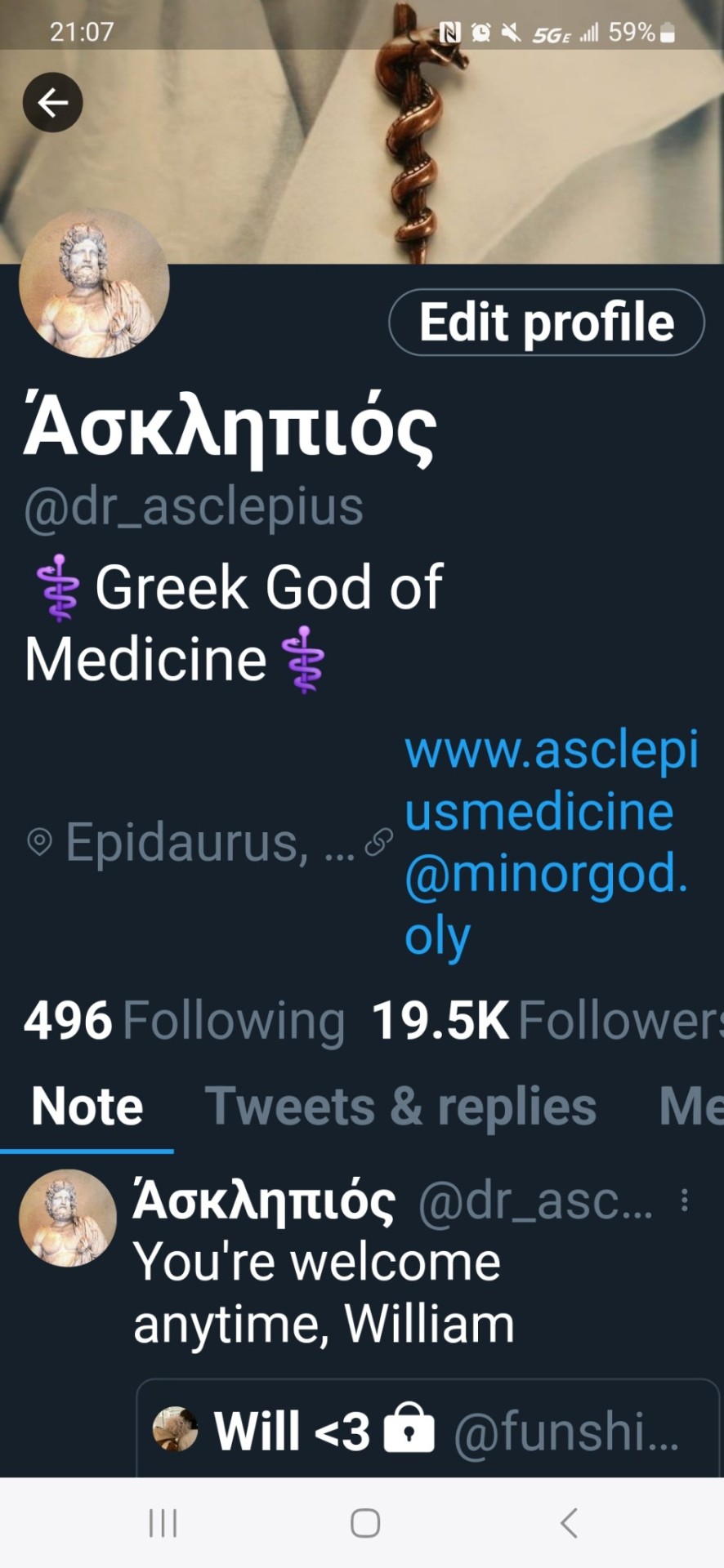
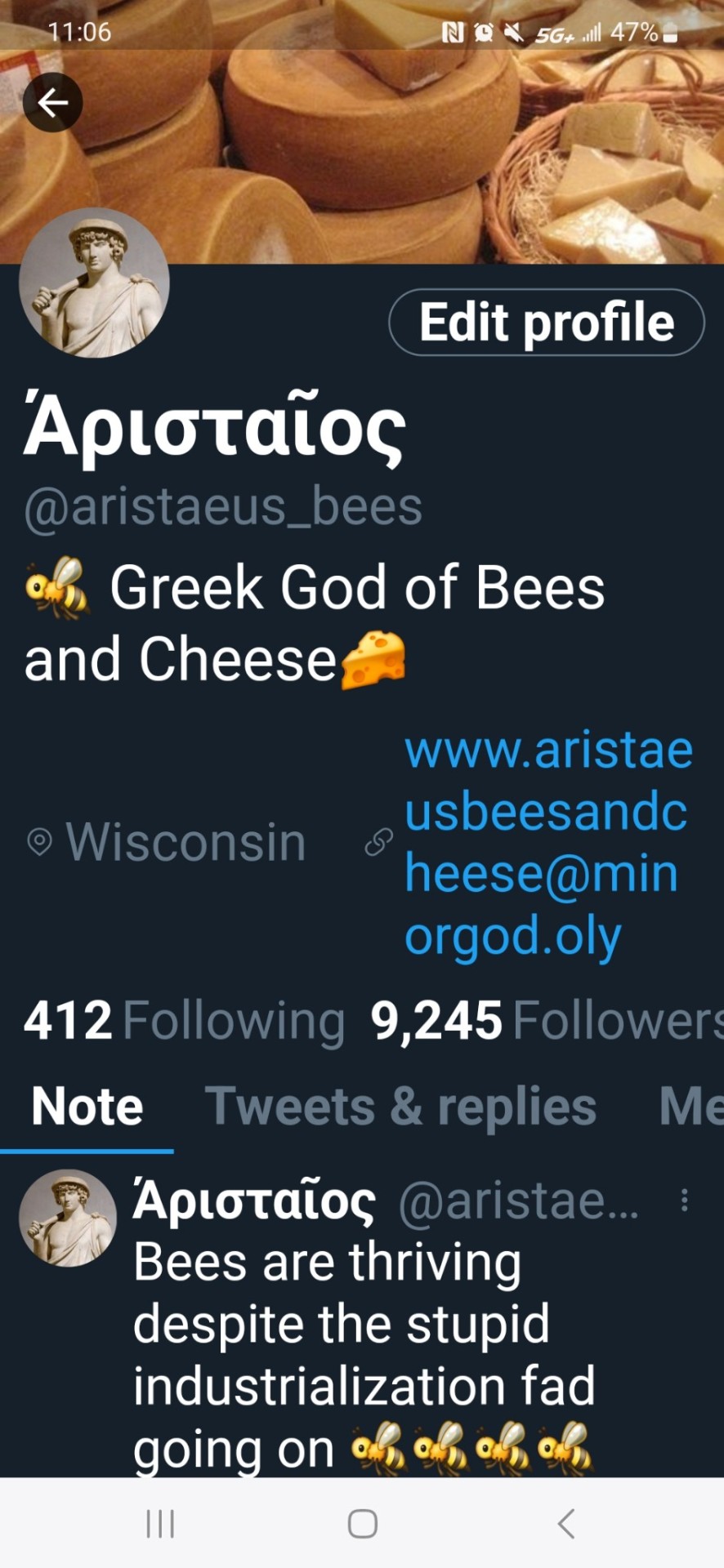
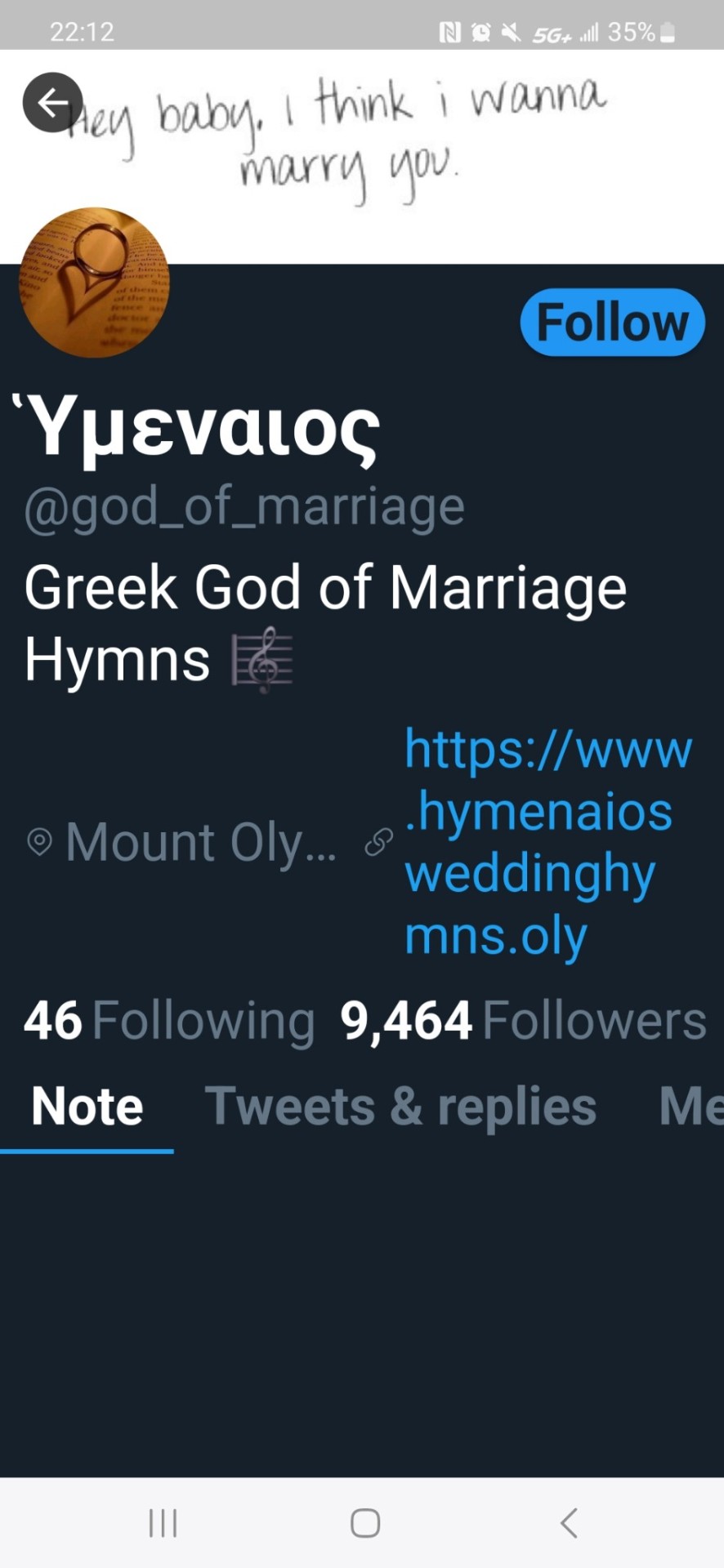
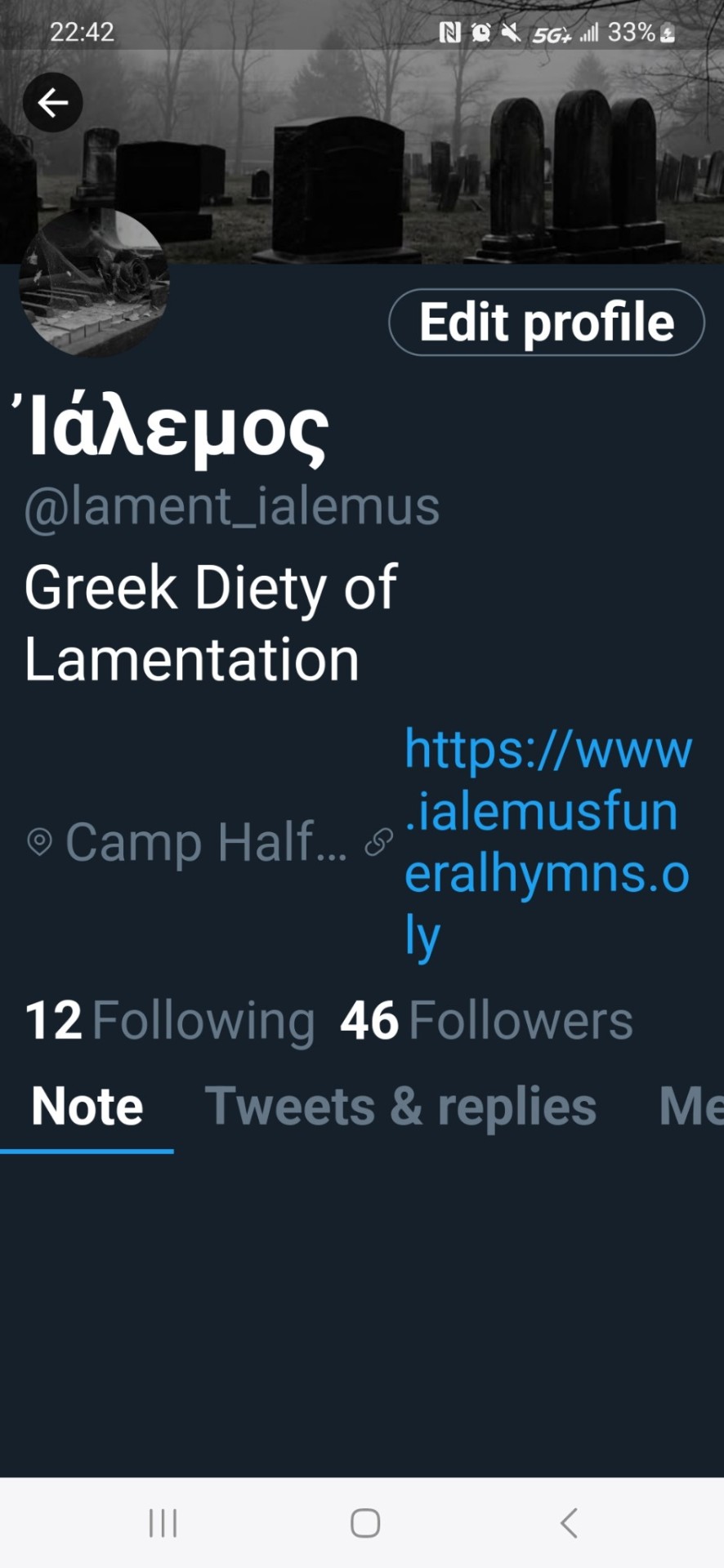
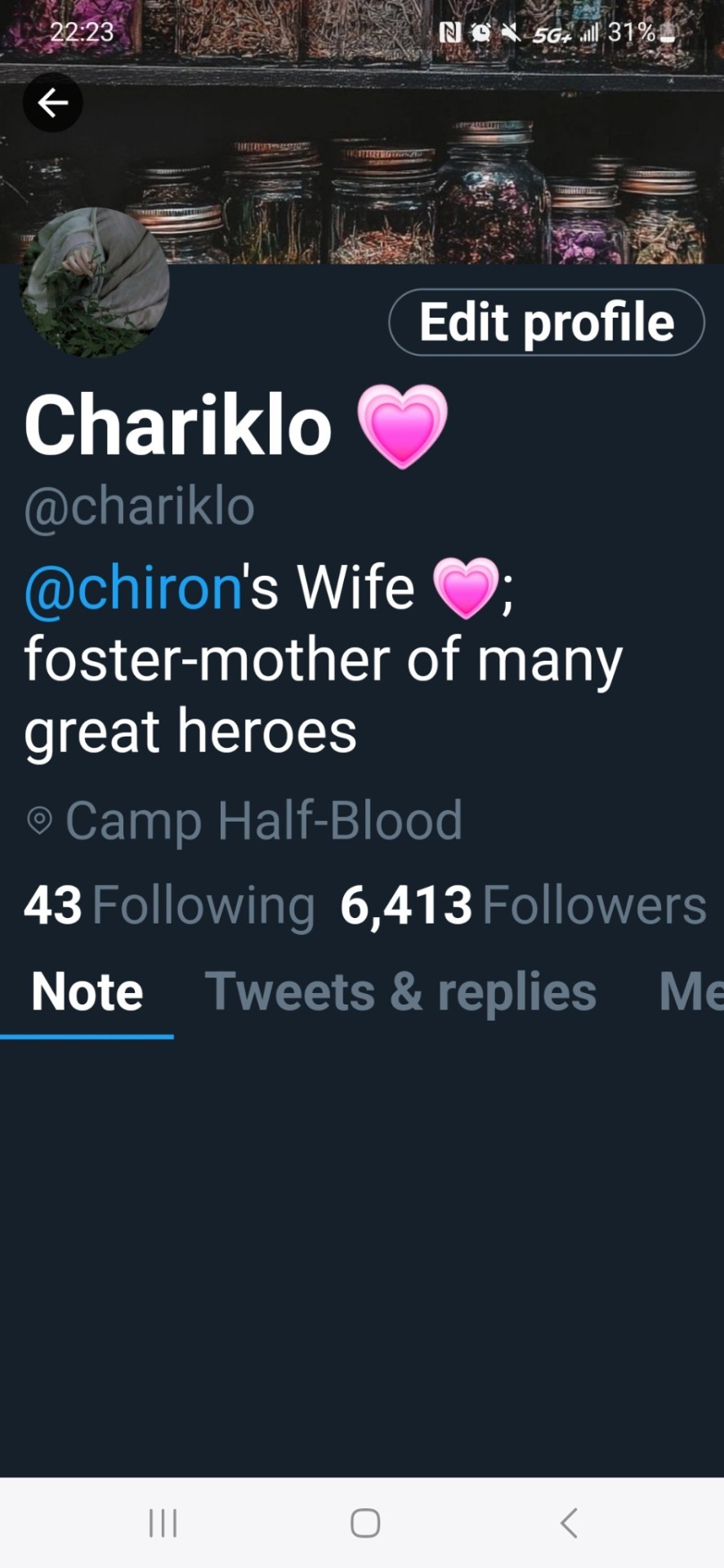
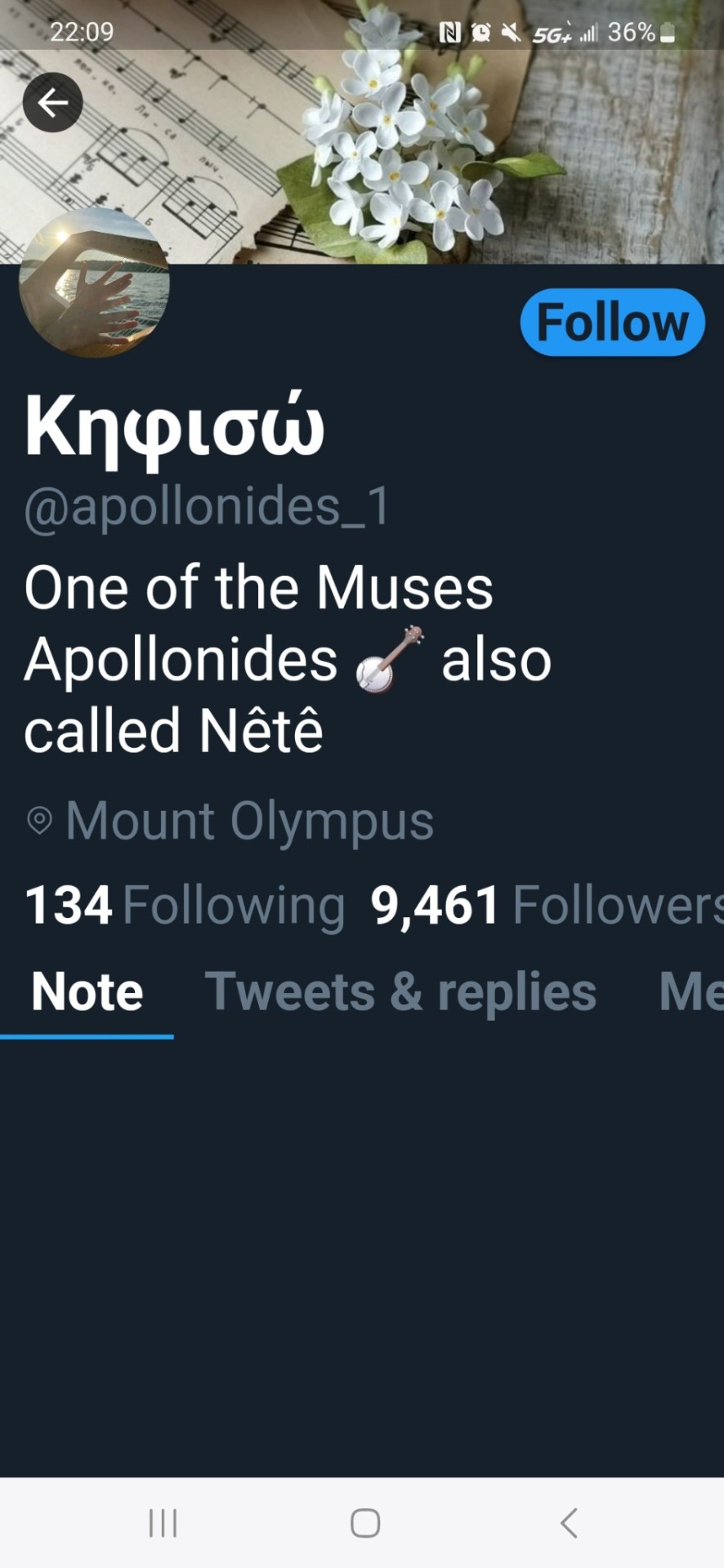
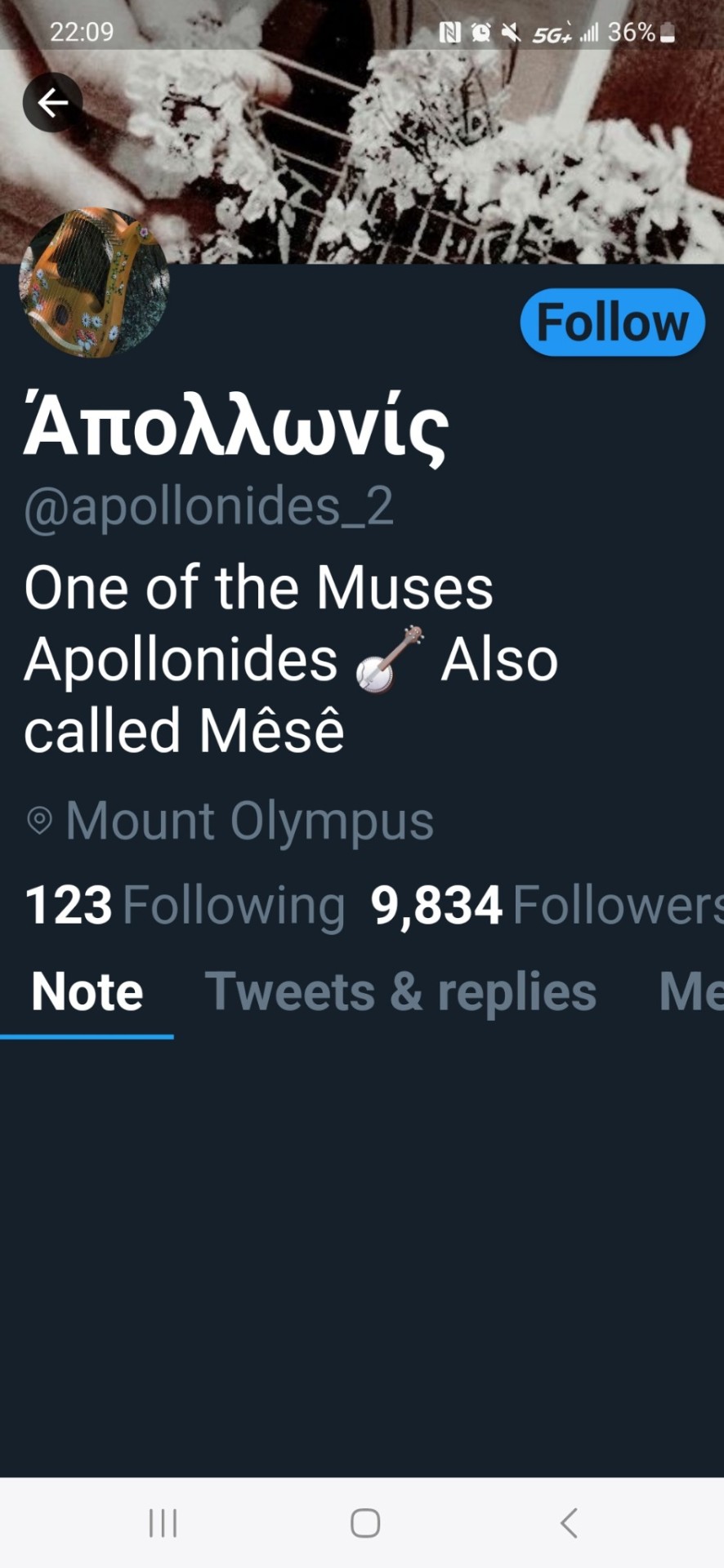
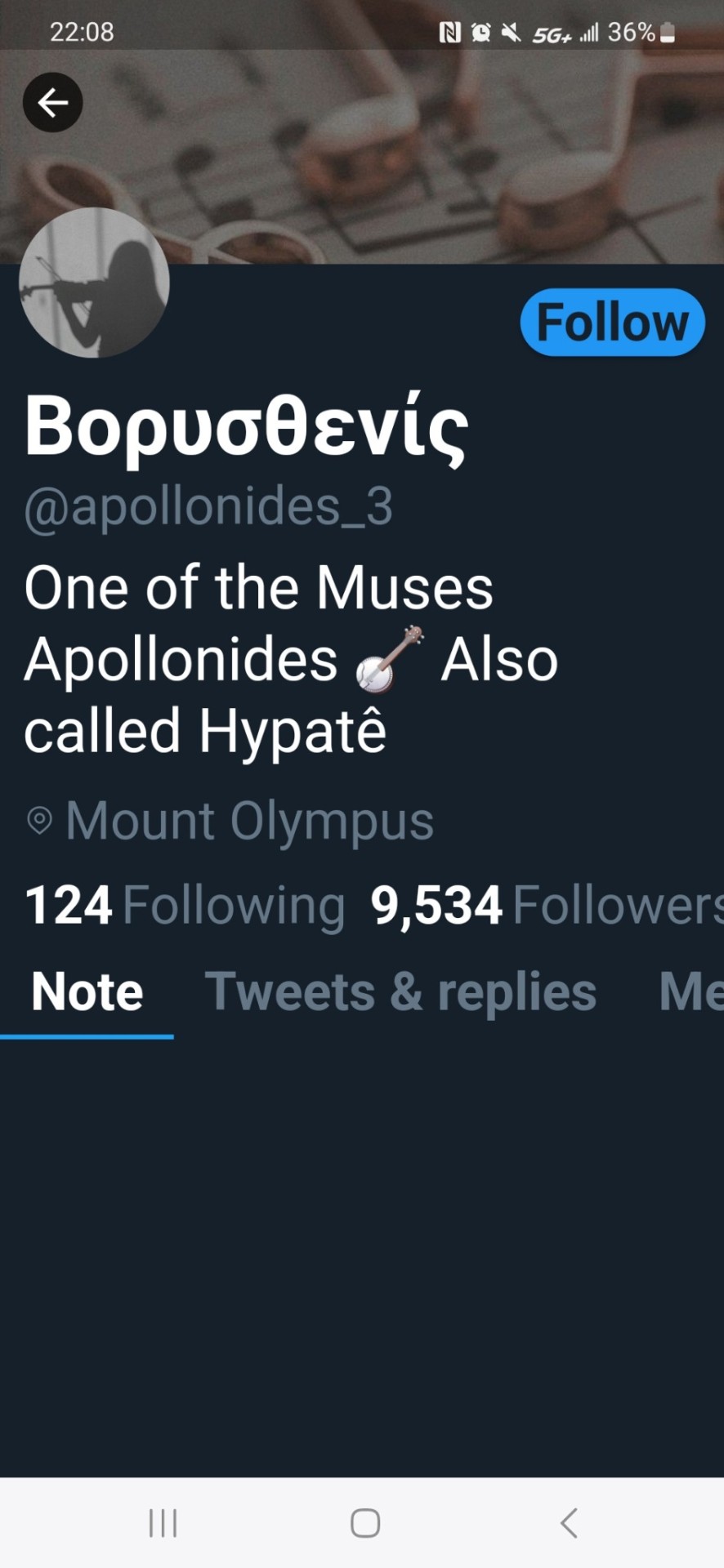
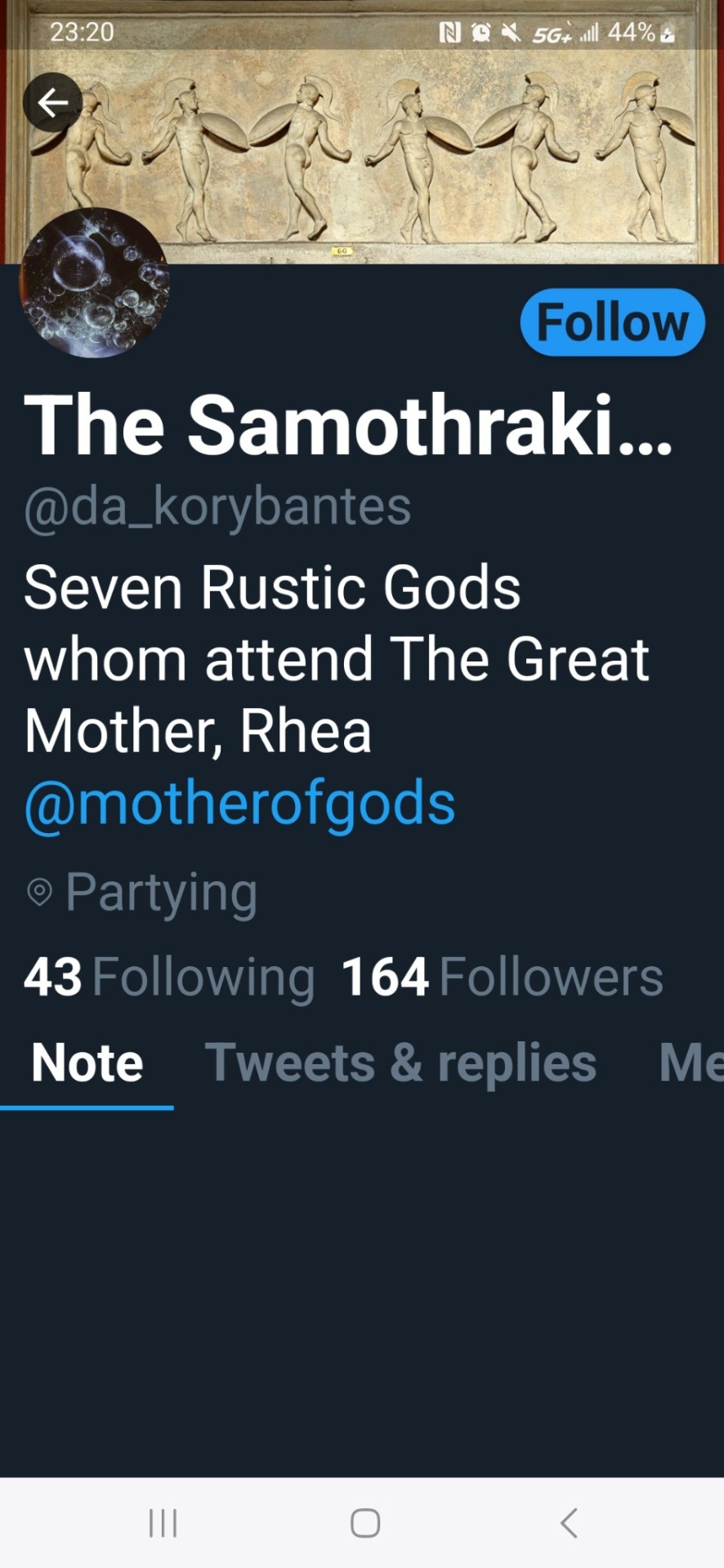
Domains
Άπόλλων (Apollo): the sun, light, music, archery, healing, disease, poetry, protection over young (specifically boys), civilization, reasoning and logic, knowledge, and herding
Άσκληπιός (Asclepius): Son of Coronis and Apollo; medicine
Άρισταῖος (Aristaeus): son of Cyrene and Apollo, older brother to Idmon; bee-keeping, cheese-making, olive-growing/olive oil manufacturing, herding, hunting, countryside and pastoral places
Note: I haven't made Idmon a profile, as he isn't a god. He was a seer and an original Argonaut and died on the trip. Maybe I will though, who knows?
Ύμεναιος (Hymenaios), also called Hymen: son of one of the Muses (though disputed which one, usually Terpsichore, Urania, or Calliope) and Apollo; weddings, bridal hymns
Note: other sources claim his parentage is Magnes and Clio, or Dionysus and Aphrodite
Ίάλεμος (Ialemus), disputed sources say he's an epithet of Linus: son of Calliope and Apollo; lamentation, funeral songs
Note: Ialemus' existance is disputed, as to whether he is a epithet of Linus or a full personificafion of funeral songs. According to some sources in Argive, Linus was the child of Apollo and Psamathe and was killed as a baby by rabid dogs. In revenge, Apollo sent a poine to kill the Argive children, and it wasn't until Coroebus killed the poine and founded a dog killing holiday called Arnis that Linus and Psamathe were worshipped. Other sources in Thebes have his parents being Urania and Amphimarus, and was killed by Apollo for claiming to be his equal. Lastly, he was described as Heracles' music teacher, who slew him in a fit of rage while being reprimanded. Take of that what you will.
Χαρικλώ (Chariklo): daughter of Apollo, no second parent named; wife of Chiron, foster-mother to the heroes whom Chiron mentored
Note: Chariklo is also said in a few sources that her father is Perses or Oceanus, but the comedic value of Apollo beings Chiron's father-in-law is too great to pass up. And most sourses agree she's Apollo's kid. Fun fact though, the planet Chariklo from the Centaur planets is named after her, and another one is named Chiron.
Κηφισω (Cephisso), also called Nete: daughter of Apollo, sister to Apollonis and Borysthenis; one of the Muses Apollonides
Note: the Muses Apollonides are not to be confused with the nine muses of the arts, or the Titan Muses.
Άπολλωνις (Apollonis), also called Mete): daughter of Apollo, and sister to Cephisso and Borysthenis; one of the Muses Apollonides
Βορυσθηνίς (Borysthenis), also called Hypate: daughter of Apollo, sister to Cephisso and Apollonis; one of the Muses Apollonides
Note: Fun fact, their second names: Nete, Mete, and Hypate are after the lowest, middle, and high notes of the lyre
Κυρβαντες (The Samothrakian Korybantes): sons of Apollo and Thalia; a seven group of rustic daimons who presided over the Samorhrakian mysteries, and were attendants to the Mother of the Gods
Note: Wow, the myths on these guys are so disputed they don't even have a set of names. Other parentage options include Zeus and Calliope, or Apollo and Rhetia. Some sourses say there's seven, with two others who are children of Hephaestus (the Cabeiri) to make a group of nine, some say there's nine total. They're named after an orgiastic dance, that to be honest, I am fine not knowing anything about. Additionally, some say they're from Asia (west Asia or Anatolia, which makes up much of modern day Turkiye) and were attendants to Cybele, the Magna Mater of Anatolian mythology, but she is sometimes identified with Rhea when she was adopted by Greece, hence why I made them attendents of Rhea. Some sources also associate them with Leto.
#greek mythology#apollo percy jackson#asclepius#aristaeus#the muses apollonides#chariklo#The Samothrakian Korybantes#Hymenaios (god)#Ialemus#pjo hoo toa#lester papadopoulos#this is the definition of an overachiever isn't it?#But the research was so cool to do
21 notes
·
View notes
Text
Cyrene, Apollo and Ares (and how it was actually only Cyrene and Apollo and Wikipedia is not always a reliable source)
Some of you might know the myth in which Apollo's lover - Cyrene met Ares and had a son named Diomedes (NOT the same guy as Diomedes from Iliad) with him.
Except... she didn't.
When I was researching Cyrene some time ago I realised that her article on Theoi (great source btw) doesn't mention Ares at all. I didn't pay that much attention to this back then, after all, most of the myths have many versions so I assumed that the one with Ares is just less popular one.
I was more preoccupied with the fact that Idmon who I always thought to be Apollo and Cyrene's son was not actually always listed as theirs and had like 5 different variants of parentage.
Let's start with Cyrene's children and why Wikipedia should not be used as a primary source.
Her Personal Information Section on Wikipedia lists 3 children: Aristaeus, Autuchus and Idmon. Later in the Family section it's said that she also had Diomedes with Ares.
For the life of me I could not find anything about Autuchus in the ancient sources BUT I found that Anthocus (which is kinda similar) was the title of Aristaeus and was sometimes mistaken for another son of the pair.

So likely it is the same mistake.
Aristaeus is also the one who is almost always said to be son of Apollo and Cyrene and both of his parents appear in his myths.
Idmon like I said had many different sets of parents: Apollo and Cyrene, Abas and Cyrene, Apollo and Asteria (NOT the sister of Leto), Apollo and Antianeira, Apollo and Abas (one is bio father, the other is foster father, I think????). He also doesn't have an article on Theoi so reserch on him is going to be a nightmer. 🙃
And now Diomedes
Wikipedia says this
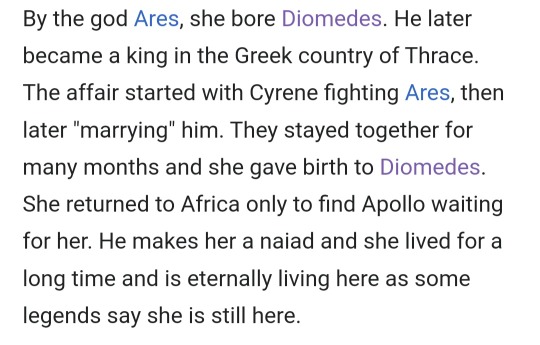
But does not link any source for this story
What's more: there are sources describing Apollo changing Cyrene into a Nymph and they also don't mention Ares AT ALL. They are also written in a way that suggest that changing her into a Nymph was one of the first things Apollo did after meeting her.

This doesn't add up with this Ares thing at all.
So where did the Wikipedia article got this Cyrene-fighting-Ares story from? Well, I decided to look into edits history and this section was actually deleted a few months ago with this comment.
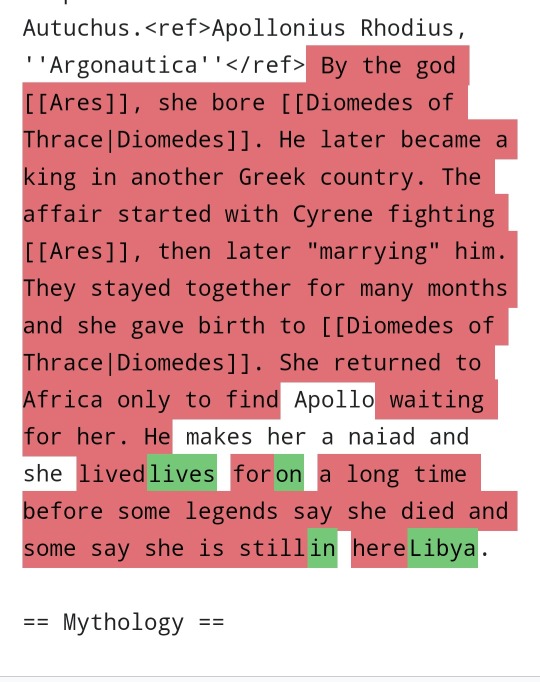
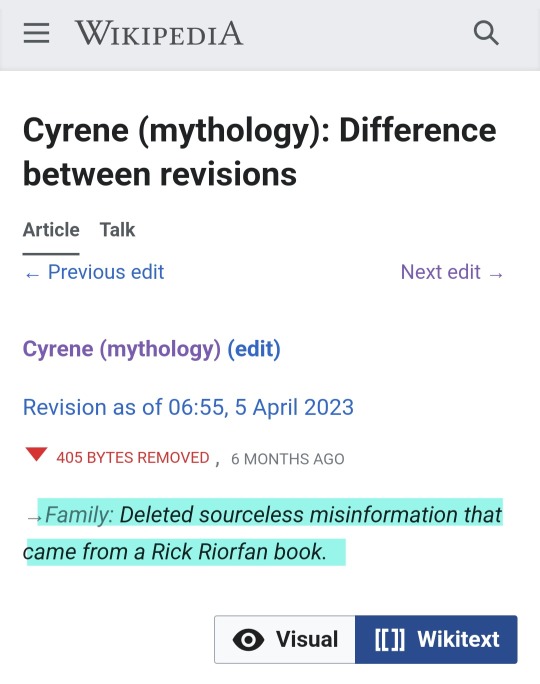
My honest reaction to this information: 😐
And then the section was revived for some reason.
But you know when it was first added? 2 years ago.
When did Rick's book about Greek heroes came out? 8 years ago.
So right now Cyrene's Wikipedia article is misleading and contains information from a RETELLING stated as facts.
The only thing I could find that was linking Cyrene with Ares was this:

and it doesn't even say if this is the same Cyrene. It could be, but we have to remember that in the myths there were like 14 dudes named Abas (and 5 named Idmon while we're at it.)
+this is a very late source compared to all the other Cyrene's myths.
Other source claims that Diomedes' mother was Asterie
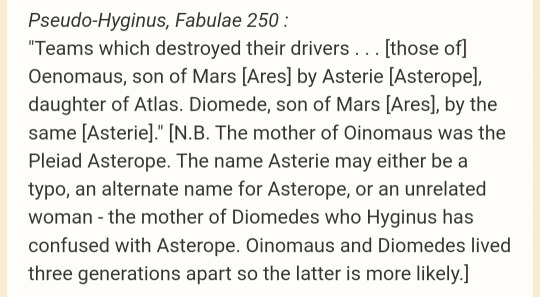
I personaly think those are two different Cyrenes and here's why:
• Cyrene (Apollo's lover) when introduced in the myth is usually accompanied either by her parentage or by some other characteristic like "sheparderss" "huntress" "archeress" "lion slayer" and so on. Cyrene from Ares' myth has nothing to her name which makes me think she was just some random women.
• Non of Cyrene's own myths ever mention Ares (or I couldn't find any), while Apollo is mentioned often.
• Apollo's Cyrene was Thessalian and Diomedes (and therefor his mother likely as well) was Thracian
• There is literally nothing I could find that would suggest that Apollo's Cyrene and Cyrene from Ares myth are the same and since there are many characters in the mythology with the same names (again 14 Abas') labeling these two as one is irrational (Diomedes himself shares the name with one of the Iliad's characters).
Anyway, lesson for today: be careful while reading Wikipedia and always check the sources.
This kinda scares me tbh because how many more of those articles treat retellings as actual sources and were added by fans of the said retellings?
I hope somebody will fix this article because wtf
#apollo#cyrene#ares#rick riordan#wikipedia#greek myths#greek gods#greek mythology#greek panteon#Idmon#aristaeus#diomedes#lovers of apollo#children of apollo
281 notes
·
View notes
Note
I’m still rather new to Greek mythology and so I need confirmation 😞
What is the difference between Apollo and Helios?
Is Apollo like light or what?
IM SORRY 😭😭😭😭😭
Hi ! No problem. We all start somewhere. So let's see each god separately, because they are indeed not the same. The line gets a bit blurry in later times (roman) but they are distinct in Greek mythology.
Helios
Is the god of the sun. That's his main attribute. He's the brother of Selene, the moon, and Eos, the dawn.
They're all children of the Titans Hyperion, the light and Theia, the goddess of sight.
Helios is the father of figures like Circe, Pasiphae, Phaeton and Aetes (Medea's dad). He has a few lovers, all of them being women.
He's shown riding a charriot of four horses, that even have their own names.
Helios appears in the Odyssey for example, as Odysseus' men steal and eat his cattle, then anger him
Little off topic but idk if you're a fan of Epic the musical but the fandom often confused Apollo and Helios. The "god of the sun" in the end of Mutiny is Helios. Because he's the one offended in the original Odyssey.
Just saying that so you know you're not alone in this.
Anysays, back to the myths.
He's also the one to snitch on Ares and Aphrodite when they sleep together without Hephaestus knowing. Then he snitches on Hades for kidnapping Persephone.
Helios sees everything and he's not afraid of telling everyone if asked. Because he's the sun. Iirc Selene also has this capacity in the nighttime.
Apollo
Apollo is the son of Zeus and Leto, as well as Artemis' twin brother.
He isn't really the god of the sun, at least that's not prevalent until roman mythology. His thing is more music, poetry, healing/diseases, truth, mathematics.
Edit : and he's a god of prophecy. Very important detail that I forgot in the original post.
As an Olympian, he's more prevalent than Helios and appears more often in the myths.
He's in the Iliad for example, as a protector of the Trojans. He also appears in plays like Alcestis from Euripides or the Oresteia from Aeschylus.
He also plays a role in many isolated stories talking about his love life, his exploits, him punishing mortals or just people that annoy Leto. Because he cares about his momma.
You're absolutely right in the fact that he's related to light, most notably with his epithet Phoebus/Phoibos, which means shining or brilliant.
Funnily enough, he also has a cattle story, but it's related to his younger half-brother Hermes being an absolute scallywag of a baby and stealing them (this myth always makes me laugh 😂).
Apollo also has a bunch of lovers, with a lot of high and lows. Most of them being women but there are also some men : Hyacinthus being the most well-known. There's also Cyparissus, Admetus and Adonis for example.
For the women, there's Cyrene, Urania (the muse), but also stories that ended badly like with Cassandra or Coronis. The former rejected him despite a promise and the latter cheated on him.
And then there's Daphne, but that story is pretty well-known.
Among Apollo's kids, there's figures like Asclepius, Aristaeus, Idmon, sometimes Orpheus and even Chiron as an adoptive son (his biological father is Kronos).
Btw Apollo is involved in the life of every single one of these kids. Yes, praising Apollo as a father is important to me personally.
Fun fact: his daughter Chariclo even married Chiron. That's sweet :3
Fun fact n°2 : Apollo let Chiron raise his sons Asclepius and Aristaeus.
Because I won't stop rambling about Apollo being a dad, here is this post so I shut up :
Apollo tends to react pretty strongly when offended, a trait he shares with many Olympians. Just don't mess with Leto, Artemis or any of his kids and normally you should be fine.
#yes this post turned into fun facts about Apollo and his kids by the end 😂#sorry but this is super important to me right now. I'm in a Dadpollo phase#helios#apollo#phoebus apollon#ask#greek mythology#greek myth discussion#not a reblog
24 notes
·
View notes
Note
Did Cyrene love Ares and have a son with him?
In Greek mythology, Cyrene’s relationship with Ares is generally portrayed as more of a fleeting affair, while her connection with Apollo is the more significant and enduring relationship in her story. The myth focuses primarily on her union with Apollo, who fell in love with her after witnessing her wrestling a lion with her bare hands. He admired her bravery and strength, carrying her off to Libya, where he founded the city of Cyrene in her honor. She became queen, and together they had two sons, Aristaeus and Idmon.
There’s no detailed mythological account suggesting that Cyrene stayed with Ares or had an ongoing, long-term relationship with him. Ares' role in her story seems to be more of a brief romantic encounter that resulted in the birth of their son Diomedes (he was a king of Thrace, notorious for his man-eating horses, which became one of the tasks in Heracles' Twelve Labors). In contrast, her relationship with Apollo is much more central to her legacy and status as a mythological figure tied to a specific region and lineage. Unlike some other myths where gods remain connected to their mortal lovers until death, Cyrene's later life and death are not widely detailed, leaving her ultimate fate somewhat mysterious. However, in most versions of her tale, she remains associated with Apollo and the city of Cyrene rather than continuing any relationship with Ares.
20 notes
·
View notes
Note
The wind, smelling of ocean salt and light, swaying the hems of clothes, hair and the veil on his head. Kore feels uncomfortable. She always feels uncomfortable in the past, especially someone else's, sticking her nose in their business is not very good. And it's not pleasant. She lowers her head and hunches her shoulders, pulling the white veil tighter over her head - a light, slightly transparent silk hugs her shoulders and back as if wet - in visions she always wears Greek clothes. A white chiton, green himatias and a veil to protect her from the heat/hide her from her father's eyes and hide if necessary. Although she does it more for self-satisfaction, no one can see her anyway. She is a ghost, an ephemeral creature from the past or the future. She swallows and stubbornly walks forward, her bare feet are pleasantly caressed by the hot sand and yet, raising her head, she sees a giant ship - a real work of art, as if created by the hands of Hephaestus himself, this is definitely the best ship this century has to offer. But she doesn't care about the ship - Argo, the ship of the hero Jason, the favorite of Hera - she is attracted to the people standing next to him and their loud voices… She notices the bright golden sheen of long hair, the same as hers. She runs, letting go of her veil. She freezes just a few steps away from them, her eyes greedily absorbing the scene in front of her, the major moment of her brother's fate - Idmon Abaseis, the son of their father Apollo and Abas, mortal seer of his brother-king. He looks like her, really looks like her, even more than the other Apollo children. If they were the same age, he could have been her twin - Idmon was tall and slender on the verge of painful thinness, his silky golden hair shining down to his waist, even their clothes were similar. His golden-green eyes shone dimly. There was a slight smile on his lovely face. "Welcome Idmon!" Telamon's voice was booming and strong on the beach along with the wind, he carefully held a veil on his hands, embroidered at the edges with thin gold threads "The new seer of the Argonauts and advisor of Jason!". Idmon looked away from his friend and looked at her, his gaze warm and understanding. He moved slowly towards her, walking gracefully like a swan sacred to their father. He stood directly in front of her and leaned towards her, his kiss on her forehead was soft and pleasant, balm and comfort. The Argonauts looked confused, they'll get used to it. "My radiant sister," his voice sounded soft and affectionate, like basking in the rays of the setting sun, "You have done everything in your power... I'm sorry that you look like me" "It was an honor for me." she bends down and snuggles up to him, he is warm and soft, she absorbs his warmth like a hungry earth absorbs rainwater. They hug until her visions end.
[Kore was sitting on her bed - it was immaculately tucked in and covered with a soft woolen blanket. Kore wore a wide sweater, her long hair was pulled into a careless bun, loose thick strands streamed down her shoulder to her ribs. She was holding a steaming mug of tea in her hands]. Idmon was the Argonauts' seer and Jason's advisor.
[She took a sip of tea and smacked her lips a little, her breath sounded short and jerky]. He knew he was going to die, but he joined them anyway... I repeat his fate. Moirai really loves graceful repetition.
And... [She tapped the mug several times with her short nails, the sound was surprisingly melodious]. They greeted him the same way you greeted me.
Ethan: *his eye widens as he frowns in surprise and disbelief* Your… brother, you say?
Alabaster: *his gaze wonders somewhere above, as if he’s struggling to remember something* Idmon…argonaut, the knowing one, son of Abas… Oh, fuck.
Alabaster: I… I never made the connection! I’m so stupid, stupid, stupid, I should have. I know the story of the Argo by heart. I…
Alabaster: *pauses* Idmon died killed by a boar, didn’t he? He died knowing that he will, it was his fate, but… it wasn’t right. Although he’s your brother, your mirror, yeah, I know; even though you two should be the definition of “history repeats itself”… I still think that there’s a difference between you and your brother.
Alabaster: Jason never tried to help his Argonauts. Didn’t he leave Hilas to die on that island, abducted by nymphs? Didn’t he leave Heracles, his most valuable mate, behind? I’m nothing like Jason. I can still help you.
Ethan: *his empty gaze falls on Alabaster* You only say that to appease yourself, Al.
Alabaster: At least I’m trying to…
Ethan: *gestures to him to stop* *kneels down next to Kore* This is exactly like…
Ethan: *closes his eye, recalling the day Kore was welcomed on Princess Andromeda* You told me about what will happen after my death, about the Nemesis cabin, about Damien. I was too cowardly to think too much about it at the time. And I held your hand and raised it in the air: “Welcome Kore Pythia Hayashi to our ship! The new advisor of Kronos!”. I felt prideful, and for what? For guiding you to your own death?
Ethan: This damned ship is a grave in development. I have no clue how you could step in it so bravely, like a pig into the slaughter house. You might have lived longer if you weren’t so keen on helping us. And how this Idmon guy did the same entering the Argo. *a ghost of a smile crosses his face* I’ll need to have a little talk with him once I reach the afterlife, won’t I?
Alabaster: *wiping his eyes, now wet* If you do, tell him that I was stupid and couldn’t save you.
Ethan: For fuck’s sake, Al! Nobody asked you to be our savior! Stop beating yourself up and understand already; you’re not stronger than fucking fate!
*Al opens his mouth, but is soon stopped by the sound of a door. All three startle as Luke enters the room.*
Luke: Idmon, right?
Ethan: You’ve been listening to us?
Luke: *ignores him* It’s funny and cruel when fate does this. It repeats and repeats and repeats, like some sort of fucked up game that we have to take part in. This is all that the gods can do, repeat history over and over again. This is all we deserve, apparently… doesn’t this make you angry, Kore? Doesn’t this continuous tread of mindless fuckery that runs again and again like a river over the bloody millennias, doesn’t it make you want to…
Luke: *growls and stops himself from talking before he starts to shout* I pity you, Kore. I pity Idmon. And I pity myself, too.
Luke: *exits the room, leaving silence behind*
#[I worked so hard on this gosh]#[I really hope you like it]#ask princess andromeda#ethan nakamura#alabaster torrington#luke castellan#titan army#pjo#pjo ask blog#percy jackson and the olympians#percy jackson#kore pythia hayashi
7 notes
·
View notes
Note
The wind, smelling of ocean salt and light, swaying the hems of clothes, hair and the veil on his head. Kore feels uncomfortable. She always feels uncomfortable in the past, especially someone else's, sticking her nose in their business is not very good. And it's not pleasant. She lowers her head and hunches her shoulders, pulling the white veil tighter over her head - a light, slightly transparent silk hugs her shoulders and back as if wet - in visions she always wears Greek clothes. A white chiton, green himatias and a veil to protect her from the heat/hide her from her father's eyes and hide if necessary. Although she does it more for self-satisfaction, no one can see her anyway. She is a ghost, an ephemeral creature from the past or the future. She swallows and stubbornly walks forward, her bare feet are pleasantly caressed by the hot sand and yet, raising her head, she sees a giant ship - a real work of art, as if created by the hands of Hephaestus himself, this is definitely the best ship this century has to offer. But she doesn't care about the ship - Argo, the ship of the hero Jason, the favorite of Hera - she is attracted to the people standing next to him and their loud voices… She notices the bright golden sheen of long hair, the same as hers. She runs, letting go of her veil. She freezes just a few steps away from them, her eyes greedily absorbing the scene in front of her, the major moment of her brother's fate - Idmon Abaseis, the son of their father Apollo and Abas, mortal seer of his brother-king. He looks like her, really looks like her, even more than the other Apollo children. If they were the same age, he could have been her twin - Idmon was tall and slender on the verge of painful thinness, his silky golden hair shining down to his waist, even their clothes were similar. His golden-green eyes shone dimly. There was a slight smile on his lovely face. "Welcome Idmon!" Telamon's voice was booming and strong on the beach along with the wind, he carefully held a veil on his hands, embroidered at the edges with thin gold threads "The new seer of the Argonauts and advisor of Jason!". Idmon looked away from his friend and looked at her, his gaze warm and understanding. He moved slowly towards her, walking gracefully like a swan sacred to their father. He stood directly in front of her and leaned towards her, his kiss on her forehead was soft and pleasant, balm and comfort. The Argonauts looked confused, they'll get used to it. "My radiant sister," his voice sounded soft and affectionate, like basking in the rays of the setting sun, "You have done everything in your power... I'm sorry that you look like me" "It was an honor for me." she bends down and snuggles up to him, he is warm and soft, she absorbs his warmth like a hungry earth absorbs rainwater. They hug until her visions end.
It turned out to be much longer than I wanted. And by the way, the conversation between Idmon and Kore may look a little strange because they are both oracles, they both know everything and just said what they wanted.
And I would like to send this as a question to your @ask-princessandromeda, I am very interested in the reaction of Luke, Alabaster, Chris and Silena, and Ethan might experience some feelings of horror because the way he greeted Kore as an advisor is similar to the way the Argonauts greeted Idmon. But I'm worried that this question might be too long.
And I am interested in your thoughts and feelings about this passage, please do not hesitate to express them :)
@kore-pythia-hayashi
ASDFGHJJJGJHKKKKKKFDGJJJ
YOUR WRITING IS SO BEAUTIFUL. GOSH. I’M GOING INSANE. THE DESCRIPTIONS? GOD GOD GOD. (Pssst, do you per chance post on Ao3?)
The relationship between Kore and Idmon is so special, they are separated by thousands of years yet they’re so closely knit together, almost like they’re the same person… even regarding physical similarities. The way you described their look-alikeness send shivers down my spine; everything about it is hauntingly beautiful. They find each other through the centuries, communicating through the delicate weaving of the world; they’re so connected to the fabric of the Universe, yet so helpless in its continual unfolding.
Ethan’s shadow will be in for such a shock when it’ll reach the Underworld expecting to find Kore, only to run into the arms of her so distant lookalike
I’m intrigued by the parallels between Idmon’s welcoming on the Argo and Kore’s arrival on Princess Andromeda. (If I try hard enough, I can find an Argonaut to parallel Ethan) You’re right, it would be interesting to see the demigods’s reactions to this story. I might try to formulate a post about this, your amazing work is definitely worth it.
Once again, I have to thank you for this amazing piece of writing. The story of Jason and the ship Argo is one of my favorite myths ever, and it’s breathtaking seeing your interpretation of it and its link to Kore.
Side note, I really enjoyed the ghost detail. It gives me an idea for an ask.
3 notes
·
View notes
Text
Mythic Creatures by Culture & Region
Part 4: Greek
Full list & overview here.
This link leads to a website that documents even more Greek creatures than Wikipedia:
Abarimon (the Roman Pliny the Elder, whose source is supposedly a land surveyor of Alexander the Great); Abii, Iliad (and Greeks Ptolemy, Strabo) describes this people as hailing from Scythia; Achilleus, son of Zeus and Lamia; Achlys, Homeric, on Heracles shield, "dark fog"; Acmon (Dactyl) a dactyl in Dionysus campaign in India; Aegipan; Aerico, disease spirit; Aeternae, horned beats fought in India by Alexander the Great's men; Agathodaemon, household god, later snake form; woman's name for Amazons, Nereids, regular Greek women: Agave; Alastor see Goetia, also a name for Zeus (Zeus Alastor) & horse of Hades, as well as Greek heroes; Alcibie Amazon in the Trojan war; Alcippe: (1) Amazon killed by Heracles. (2) Daughter of Ares. (3) Daughter of Poseidon. (4) Mother of Daedalos. (5) Daughter of the gigant Alcyoneus (father slain by Heracles). (6) An attendant of Helen of Troy. (7) A princess of Elis, the kingdom in northwestern Peloppones. ; Alcyoneus a gigant; Alke (1) Amazon (2) granddaughter of Hercules (3) one of Actaion's dogs (4) personification and spirit of battle-courage and strength; Almops a gigant, son of Poseidon and a nymph; Aloadae twins (Otus "insatiate" and Ephialtus "nightmare") who grew nine fingers every month, nine fathoms (1.8m) at age 9, stormed Mt. Olympus to own Artemis and Hera, bound in the Underworld with snakes; Alphito, Plutarch says this is a boogeyman to scare children, perhaps a "corn mother"; Alpos many arms, hair covered in snakes like Medusa; Alseid nymphs of groves and glens (glen = valley with gentle slope), in Homer alseids are "alsea"; Amazons, Amazons (List) (see also Roman and Scythian); Amphisbaena, in Greek myth, Perseus flies over Libya with head of Medusa…blood creates Amphisbaene; Amycus (centaur); Amykos; Ananke, Orphic goddess of fate, partner to Chronos; Anemoi 4 wind gods; Anguiped see Abraxas. Also Roman and Iranian.; Antaeus; Antandre, Amazon; Anthelioi; Anthousai; Antibrote; Antichthones; Antiope (Amazon Queen); Apollo Amazonius the Apollo of the Amazons?; Arae; Areto Amazon; Argus; Arimaspi; Arion; Arktos (centaur); Asbolus (centaur); Aspalis; Asteria (1) minor goddess (2) daughter of Helios and a sea nymph (3) lady who murdered her husband (4) daughter of giant Alcyoneus (5) mother of a child (the seer Idmon) with Apollo (6) mother of a child (a city founder) with Bellerophon (7) Amazon killed by Heracles in defense of Hippolyte's girdle, which Heracles came to steal (8) a maiden saved from being sacrificed to the Minotaur (9) a daughter of Teucer, the half-brother of Trojan villain Ajax (10) a mother to Crisus and Panopeus by Phocus… they are connected to the myths of both Theseus and Agammemnon is somewhat convoluted ways; Astomi Pliny the Elder; Astraeus (1) titan and father of the anemoi (4 winds), (2) chief of satyrs in Dionysus Indian war (3) son of Poseidon who bedded his sister by accident, followed by suicide; Athos gigant, foe of Poseidon; Auloniad; Aura; Azone; Babys (a satyr's brother);
Bacchae; Bacchantes; Baubo; Bebryces; Bonnacon (Roman writer Pliny the Elder); Bremusa Amazon; Cabeiri; Cacodaemon; Cacus; Callicantzaroi; Calliste; Callithyia of Argos; Calydonian Boar; Campe; Cancer; Cattle of Helios; Caucones; Celaeno (1) one of the Pleiades (2) a harpy (3) princess who got with Poseidon (4) princess who got with Apollo (5) daughter of Poseidon who got with Prometheus (6) Amazon killed by Heracles;
Centaur ; Centaurs and Centaur_Early Art and Centaurides; Cerastes; Cerberus; Cercopes; Ceryneian Hind; Ceto; Cetus; Ceuthonymus; Chalkydri; Chalybes; Charybdis; Chimera; Chiron; Chrysanthis; Chrysaor; Chrysopeleia; Cinnamologus; Cissus; Clonie (Amazon); Colossus; Corus; Corybantes; Cretan Bull_minotaur's sire; Creusa; Crinaeae; Crommyonian Sow; Curetes; Cychreides; Cyclops; Cyllarus; Cynocephali;
Daimon; Dactyls; Damasen; Daphnaie; Darrhon; Deianeira; Delphyne; Derimacheia Amazon; Derinoe Amazon; Despoina_Goddess; Dioxippe (1) daughter of Helios and ocean nymph (2) princess who must eternally carry water in the afterlife with her sisters (3) Amazon (4) woman killed by her son Sipylus by accident, married to one of many men called Agenor in Greek myth (5) dog of Actaeon; Doliones; Dragon's Teeth; Drakaina; Dryad; Dysnomia;
Echidna; Eidolon; Elate; Eleionomae; Ellefolk; Empusa; Enceladus; Enorches; Epiales; Epimeliad; Epiphron; Eriboea; Erinyes; Erotes; Erymanthian boar; Euryale (1) gorgon (2) Orion's mother (3) Amazon; Eurybius; Eurymedon; Eurynome; Eurynomos; Eurypyle; Euxantius; Evandre;
Faun, Faunus ; Faunae, Fauni; Fury;
Galatea; Gale; Gargarians; Gello; Gerana Pygmy Queen; Geryon; Gigantes; Glauce (1) nymph who nursed Zeus (2) Pluto's twin sister (3) Ash tree nymph ("Melian nymph") nereid (4) hamadryad (5) Amazon (6) a daughter of Creon killed with him by Medea (7) and others; Gold-digging ant; Gorgon ; Gorgons; Gorgophone; Graeae; Gration; Griffon;
Halizones; Hamadryad; Harpy; Hecatoncheires; Hermaphroditus; Hesperides; Hippalectryon; Hippe; Hippocampus; Hippolyta; Hippopodes; Hircocervus also Roman; Homados; Horae; Hyades; Hybris; Hydra; Hylonome;
Ichthyocentaur; Ichthyophagoi; Ioke; Iphis; Iphito Amazon;
Kallikantzaros; Kallikantzaroi; Kallone; Keres; Khalkotauroi; Koalemos; Kobalos; Kydoimos; Kymopoleia;
Ladon; Laelaps; Laestrygonians; Lamia; Lampades; Lampetia; Lapiths; Leimakid; Leleges; Leuce; Leucippus; Limnad; Limos; Lip (Moerae); Lysippe (1) Amazon (2) one of 50 women who slept with Heracles in a night (3) a bunch of other people;
Macaria; Macelo (Telchine); Tecmessa; Macrobian; Maenad; Manticore; Mares of Diomedes; Marpesia Amazon Queen; Medusa; Meilichios; Melanippe; Meliae; Melinoë; Melisseus; Menippe; Menoetius; Mestra; Mimas (gigantes); Minotaur; Minthe; Minyans; Moera ; Moirai, Moerae; Molpadia; Monopod; Mormo; Moros; Myrina; Myrmekes; Myrmidon ; Myrmidones; Myrto; Mytilene;
Naiad ; Naiads; Neades; Nemean Lion; Nephele; Nereids aka Nereides; Nessus; Nomos; Nose (Moerae); Nuli Megasthenes; Nymph;
Oceanids; Onocentaur; Ophiotaurus; Oreads aka Oreades, Orestiades; Orion; Orithyia Amazon; Orthrus; Otrera Amazon; Ouroborous Ancient Egypt, Greece, Alchemy, Medieval, Norse (and check that book about different forms of the world because it has other snakes encircling the world);
Palioxis; Pallas; Pallas (gigantes); Pan; Pandi; Panotti; Pantariste Amazon; Panther; Pegaeae; Pegasus; Peleiades; Penthesilea; Persephone; Phaethusa; Philotes; Phobetor; Phoebe; Phoenix; Pholus; Phorcys; Phthisis; Picolous; Pleiades; Polemos; Polemusa Amazon; Polybotes (gigantes); Polydora; Potamides; Proioxis; Pronomus; Propoetides; Proteus; Protoplast; Psychai; Psychopomp; Pygmies; Python;
Remora;
Salamander; Satyr but not Satyress; Sciritae; Scitalis; Scylla; Semystra; Seps; Shade; Silenus; Sinoe; Siproeta; Siren; Sithon; Smilax; Soter; Soteria; Sphinx; Stheno and Euryale; Strix; Stymphalian birds; Sybaris;
Talos; Tarand; Taraxippus; Telchines; Teleboans; Telemus; Teumessian fox; Thalestris Amazon ("And where was I, then?"); Theomachy; Thermodosa; Thiasos; Thiasus; Thoe; Thrasos; Thriae; Titania; Titanis; Titans; Tityos; Triteia; Triton; Tritopatores; Troglodytae; Trojan Leaders; Trojan War characters; Typhon;
Unicorn (check the wiki page for the Greek authors);
Vrykolakas (also Slavic);
Werehyena; Werewolf; Wild Man, Wild Woman ; Wild Men, Wild Women (continuity between satyr myths and wild man myths);
Xanthippe; Xanthus;
Zelus
allegedly Greek
Aegea listed in the 1911 Encyclopedia Britannica as an Amazon Queen; Demogorgon; Ipotane first attested with John de Mandeville; Odontotyrannus
Minoan
Minoan Genius; Minotaur allegedly Minoan
#mythic creature list#mythic creatures#mythical creatures#legendary creature list#legendary beings#legendary being#creature list#list of creatures
2 notes
·
View notes
Note
To the creator of the character: You always impress me with how much symbolism there is in Kore’s story and how complex of a person she is. Can you point me to the moment you started developing her, or to a source of inspiration? It’s fine if you can’t answer this question, I’m just really curious about the process of creating her :)
From the creators of the character - I came up with her just thinking, "It would be cool if there was a prophetic child Apollo who does not speak riddles/prophecies, but says everything as it is and accepts his fate with humble firmness… She also has gorgeous long hair. She is also on the side of the Titans and is not hostile to the camp and the Olympic demigods".
The prototypes of Kore - Rapunzel, Elia [tango in Cabin seven, author of "Helectra"] and Idmon - the son-oracle of Apollo, who foresaw his death but still became an Argonaut, thereby bravely and humbly accepting his fate.
Her backstory is not inspired by anything, but I came up with it listening songs of Mitski [it is in honor of the singer that Kore received her Japanese origin], Paris Paloma, Madonna and Chloe Ament, Taylor Swift.
2 notes
·
View notes
Text
Persona World’s Demon Encyclopedia - Days 7-10
Day 1 - Day 2 - Day 3 - Day 4 - Day 5 - Day 6 - Twitter thread
All entries can be found in my blog, tagged as “demonic compendium.”
Sorry for not posting anything in the past few days. Real Life™ has been hectic, but here’s all the profiles that should have been posted if everything went according to plan. Since I missed four days it should’ve meant 12 profiles, but 3 of those are stuff I’ve already translated in the past so they don’t count. Which means here’s a whooping FIFTEEN profiles in total. Enjoy!
Ah Puch
Mayan death god. He looks like a white skeletal figure with protruding ribs and patches of decayed skin. He wears bells all throughout his body and is accompanied by a dog and an owl.
Ah Puch is the leader of the Bolontiku, a group of nine gods who govern Xibalba, the Mayan underworld. He also presides over Mitnal, the lowermost layer of Xibalba.
Abe no Seimei
An onmyōji who lived in Japan during the Heian (794-1185) period. It is speculated that he’s a descendant of Abe no Musaki, but his mother’s identity is unknown, though some believe that his mother was the fox spirit Kuzunoha.
Seimei’s name has also been recorded in multiple manuscripts, some of them depicting legends that stray from reality. In the Konjaku Monogatari, Seimei was a pupil of Kamo no Tadayuki and learned the secret arts from him. It was also said that he had outstanding abilities, such as being able to divine the cause of the Emperor’s illness, and also employ a total of twelve shikigami.
Seimei’s arch nemesis was Ashiya Douman. The two of them once competed to see who was superior and Seimei won. In retaliation, Douman assassinated Seimei’s father, but Seimei was able to revive him using his power.
Nowadays, the Seimei ward of Kyoto houses the Seimei Shrine, which celebrates the anniversary of Seimei’s death every year with a festival on September 26.
Apep
Egyptian snake god born from the primordial sea. He embodies chaos itself, and is also called “The Great Serpent.” He’s also associated with Ouroboros, the giant serpent from Greek mythology that surrounds the world.
As his name suggests, Apep’s body is gigantic. Every day, the sun god Ra carries the sky from West to East, and Apep attempts to swallow it. As a result of Apep’s actions, the day-night cycle exists.
Apollo
A Greek god. He and his twin sister Artemis were born from Zeus and the goddess Leto. He was fed nectar and ambrosia, the drink and food of the gods, and thus grew into an adult in only a few days. He performed many heroic deeds, such as slaying the giant snake Python and the giant Tityos.
Apollo was a young and beautiful god, and so there are many legends that talk about his love life. However, he was repeatedly deceived and betrayed, and so his love was never returned.
Amatsu Mikaboshi
Also known as Ame no Kakaseo or Hoshi no Kakaseo, he is the Japanese god of stars.
In the Nihon Shoki, the gods Take-Mikazuchi and Futsunushi tried to subjugate Ashihara no Nakatsu Kuni during the Tenson Kōrin, but Amatsu Mikaboshi resisted them until the very end, granting him the epithet of "disobedient fierce god." However, in the end he was defeated by Shitsuri and Take-Hazuchi.
Maihime Amano
An original character appearing in Eternal Punishment.
She is a daughter from one of Kiyotada Sumaru’s branch families and Maya Amano’s ancestor. She and her lover Tatsunoshin Suou assassinated Kiyotada Sumaru, the tyrant who wanted to take over all of Japan. Even after Kiyotada’s death, her mummified remains keep watch over the city of Sumaru.
When summoned as a Persona, she has the appearance of a red-haired woman sporting two horns and wearing long-sleeved clothes.
Ameretat
One of the seven archangels from Zoroastrianism, the Amesha Spenta. She’s a daughter of the chief god Ahura Mazda and her name means “Immortality.” She’s the guardian angel of plants and responsible for governing the spiritual power of the sacred tree Haoma.
She often appears in conjunction with the god Haurvatat, whose name means “wholeness” and “satisfaction,” as the two of them are associated with water and plants. By uniting their powers, the two of them are capable of sending forth rain. Flowers are given as offerings in rituals that worship Ameretat.
Ame no Uzume
Japanese goddess of kagura and performing arts. When the goddess Amaterasu hid herself inside a cave known as Ama no Iwato and darkness fell over the world, Ame no Uzume danced in front of it with her breasts and crotch exposed, attracting Amaterasu’s attention and drawing her out of the cave.
“Uzume” means traditional Japanese hair ornaments, also known as kanzashi, which she wears when performing a kagura. It’s also believed that Ame no Uzume was originally a mortal woman who became deified.
Amon-Ra
The chief god of ancient Egypt. His name means "he who is hidden," and he's commonly depicted in murals as a person wearing a large feather hat.
Originally, Amon and Ra were two separate gods, but once the capital was moved to Thebes during the Middle Kingdom, the two gods were merged into one. They became Amon-Ra, sun god and supreme deity of Egypt. He's also the guardian deity of the pharaohs, and according to legend the pharaohs are his descendants.
Pride
An original demon from Ibunroku with the shape of a mask. It represents the human emotion of believing oneself to be superior and looking down on others. Other names for this emotion include: arrogance, haughtiness, and insolence.
Alastor
From Greek mythology, he’s the official in charge of performing executions in Hell. Alastor is also known as “the executioner” in Zoroastrianism.
He was originally the son of the sea god Nereus, but Alastor had his wife stolen by his step-father, which prompted him to take revenge. Ever since the Middle Ages, Alastor came to be seen as an executioner who follows the orders of the devil. Because of this, the name “Alastor” itself means “avenger.”
Arianrhod
A Welsh goddess worshiped as the guardian deity of the Corona Borealis. She’s the daughter of the mother goddess Don and sister of Gwydion. Her role is to keep the silver wheels representing time turning for all eternity. Aside from turning the wheels of time, Arianrhod is also responsible for ferrying those who die in combat to the afterlife in a large boat. She’s also called the mother of the Aryan race and believed to be the same entity as the Greek Ariadne.
Alice
A mysterious girl. Her name and features resemble the protagonist of Lewis Carroll's Alice's Adventures in Wonderland.
She's an original demon in the Megami Tensei series, first appearing in Shin Megami Tensei. Afterwards, she kept appearing in other games of the franchise as a rare demon.
Arachne
Greek goddess of wisdom, crafts, and weaving. She was the daughter of the famous dyer Idmon and possessed exceptional skill at weaving. However, Arachne’s pride grew too big, which made her challenge the gods to a weaving contest. In the contest, she weaved various depictions of scandals committed by the gods in a tapestry, which drew their ire. As punishment, the goddess Athena transformed her into a spider.
Artemis
One of the twelve Olympians from Greek mythology. She is the goddess of the moon and hunting. She can always be found running in the woods, carrying bow and arrows and accompanied by a group of nymphs and hunting dogs.
Artemis is fastidious and merciless. She once transformed Actaeon, a hunter who caught a glimpse of her naked body, into a stag and then had his own hunting dogs kill him. She also transformed a woman who broke her vow of chastity and got pregnant into a bear.
Her Roman counterpart is the moon goddess Selene.
Wow, this was a lot!
TOMORROW: Alecto, Ares, and Aonbharr.
#persona#persona 1#persona 2#shin megami tensei#smt#tagging it as smt cause this is about demons too#demonic compendium
10 notes
·
View notes
Note
OH HOW COULD I FORGET THIS!
Boreas's sons, Zetes and Calaïs, LOOOOVE Apollo. They think he's The Best, which tracks because Calaïs ALSO dated Orpheus, whom I headcanon to be Apollo's adoptive son :3
Plus, they were on the Argo mission with THREE Apollo kids. Aforementioned Orpheus, Idmon the seer, and Asclepius who would've been like THIRTEEEN at the time if we go by RRverse canon because Asclepius dies at 15 in the RRverse.
I live for all these ships with Apollo like Apollo and Thanatos, Cupid, and even the most dumpsterfire ship of all time Copollo (I go feral over these two)
But one ship that stood out to me was Boreas and Apollo, and apparently the Boreads describe Apollo as "Beloved of our sire" And the fact that Koios is basically Boreas' boss makes this so much more better
So basically I'm asking for Boreas and Apollo headcanons 👀
(And if you take fic reqs, I wouldn't mind a fic with these two)
Apollo is SOOOOOO Shippable lmao XD He has such a variety of lovers and that really allows us to be able to explore a variety of relationship!
Healthy or toxic, lmao XD Copollo is Top Tier imo
and on the topic of Boreas, I have one extra thing to add there because I personally headcanon that Lelantos, titan of air & moving unseen (and apollo's uncle), used to be the head of the wind gods but was stripped of his title by Zeus post-titan war because he sided with Kronos.
So therefore, both of Boreas's bosses are relatives of Apollo's lmao XD
HEADCANONS, EH?
ahem
Imo, Hyperborea was some sort of courting gift or something Boreas gave Apollo. Because here's the thing with Hyperborea:
It's the One Place Boreas does not blow his winds, hence its title of Eternal Spring.
Boreas's palace resides at the southern border of Hyperborea, with gryphons who live in BOTH places.
Three of Boreas's son are PRIESTS of Hyperborea, and serve Apollo when he's there.
Three of Boreas's daughters joined Artemis's hunt (Oupis features in my fic Shattered Minds, btw!)
Hyperborea is literally "over the north wind" in Greek.
I think we can all agree winter is the time Apollo and Boreas hook up lmao XD
Boreas ALSO, in some versions, is a suitor of Hyacinthus, but he clearly doesn't hold any ill-will about Hya & Apollo because let's be real, he would have picked Apollo too XD
So imagine this. Hyacinthus & Apollo making out. Then Apollo & Boreas making out. HECK HYACINTHUS & BOREAS MAKING OUT.
THIS MEME IS THEM
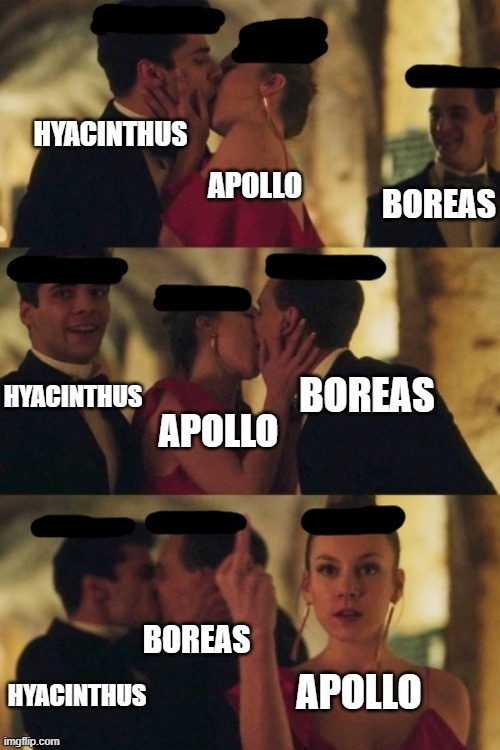
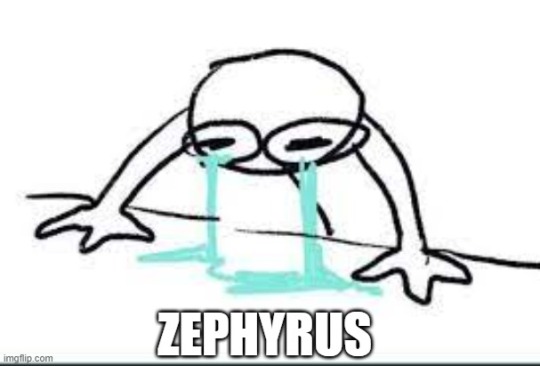
ALSO I RAISE YOU-
Zephyrus has a crush on Apollo :3 (It makes sense. also Apollo is widely associated with spring and Zephyrus is the SPRING wind, and likes pretty guys and Apollo is the prettiest so-)
I blabbered about that in the Discord with @xxzephyrbreezexx and our fellow Discord user whom I don't know if they have a blog here 😭 KNOW I AM POINTING VIOLENTLY IN YOUR DIRECTION
You are Zephyrus. You have a crush on Apollo. You also get a crush on his boyfriend.
AND THEN YOUR BROTHER FUCKS BOTH OF THEM
The Hyacinthus Debacle, as I have dubbed it, also created a bit of a rift between Boreas and Zephyrus, which is Sad because they are usually associated with each other in literature, art, ect :(
Family dinners are Awkward. Even more so when Boreas brings Apollo along to the dinners hosted at his place.
They became Especially Awkward when Helios and Selene were still around because then Boreas would have to deal with Helios's Dad Instincts kicking in and staring him down.
(Helios is Boreas's uncle btw!)
(I have a Boreas thing planned in my Helios fic eheheheh. It's funny, don't panic)
And whenever Apollo pops in the visit Eos about light-related things or Astraeus (Eos & Astraeus are the winds' parents) it Still Is Awkward because Zephyrus just. BOLTS out of the room.
He is simultaneously Gay For and Terrified of Apollo.
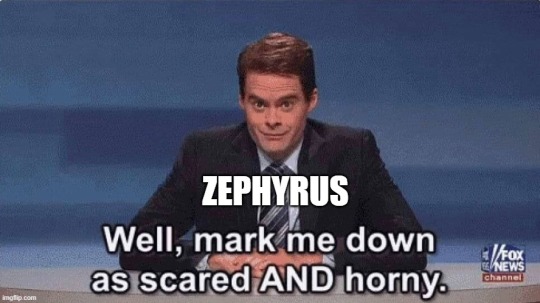
Also if Asteria tags along with Apollo (because she is shooting stars/night prophecy and Astraeus is dusk/stars) she gives Zephyrus The Death Stare.
He is equally terrified of her, minus the horny.
Cupid/Eros, eh?
...are you in the Discord by chance? Because the fellows I mentioned previously and I have also discussed this👀
We get Boreas in my next fic, btw! :D No ApolloXBoreas, sadly, but I do have plans on incorporating them into a fic!
Perhaps my revolution fic, because I am getting Ideas concerning Boreas, Apollo, and Koios... >:3
#the oracle speaks#my memes#ramblings of an oracle#apollo x boreas#toa headcanon#apollo#boreas#the trials of apollo#zephyrus#hyacinthus#hyapollo#pjo apollo#pjo zephyrus#pjo boreas#pjo hyacinthus#pjo zetes#pjo calais
206 notes
·
View notes
Text
Me, coming up with headcanons for my blog: OK, so their father’s name was Idmon Calimeris and he’s Targonian. Idmon is the name of the seer who was allegedly the son of Apollo in Greek mythology, and Calimeris is a Greek surname that originated from the Greek greeting for “good morning,” which both fit my idea of him being a former Solari. Their mother’s name was Liu Tam and she’s Ionian (as well as a descendant of the Lunari in the First Lands). Liu means “kill/destroy” in Chinese and Tam means “talk” in Chinese, the former extremely fitting for Aphelios and the latter for Alune because she never shuts up in-game and she followed in their mother’s footsteps as a seer. The twins took on her surname Liu as their middle name and Calimeris as their last name, making their full names Aphelios and Alune Liu Calimeris. I have tried my best to find full names for them that were fitting in both meaning and lore.
Riot: His name is Settrigh. It’s not a real name.
7 notes
·
View notes
Text
Day 18 of 30 Days of Apollon
How does this deity stand in terms of gender and sexuality? (historical and/or UPG)
I believe (UPG) that Apollon would as a protector of youth, protect LGBT+ children along with his sister and mother. Considering that his brother Dionysus was considered between genders and his various other siblings, uncles and father have had lovers of both genders I don’t believe that anyone can say he was against it.
Historically (in myths) he had lovers of both genders. His Lovers included:
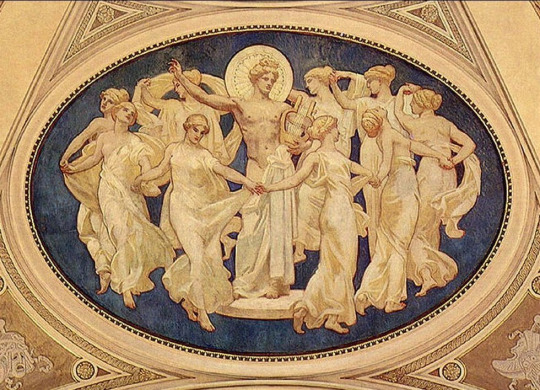
Female lovers
Love affairs ascribed to Apollo are a late development in Greek mythology.[222] Their vivid anecdotal qualities have made some of them favorites of painters since the Renaissance, the result being that they stand out more prominently in the modern imagination.
Daphne was a nymph whose parentage varies. She scorned Apollo's advances and ran away from him. When Apollo chased her in order to persuade her, she changed herself into a laurel tree. According to other versions, she cried for help during the chase, and Gaea helped her by taking her in and placing a laurel tree in her place.[223] According to Roman poet Ovid, the chase was brought about by Cupid, who hit Apollo with golden arrow of love and Daphne with leaden arrow of hatred. The myth explains the origin of the laurel and connection of Apollo with the laurel and its leaves, which his priestess employed at Delphi. The leaves became the symbol of victory and laurel wreaths were given to the victors of the Pythian games.
Apollo is said to have been the lover of all nine Muses, and not being able to choose one of them, decided to remain unwed.[224] He fathered the Corybantes by the Muse Thalia,[225]Orpheus by Calliope, Linus of Thrace by Calliope or Urania and Hymenaios(Hymen) by either Terpsichore or Clio or Calliope.[226]
Cyrene, was a Thessalian princess whom Apollo loved. In her honor, he built the city Cyrene and made her its ruler. She was later granted longevity by Apollo who turned her into a nymph. The couple had two sons, Aristaeus, and Idmon.
Evadne was a nymph daughter of Poseidon and a lover of Apollo. She bore him a son, Iamos. During the time of the childbirth, Apollo sent Eileithyia, the goddess of childbirth to assist her.
Rhoeo, a princess of the island of Naxos was loved by Apollo. Out of affection for her, Apollo turned her sisters into goddesses. On the island Delos she bore Apollo a son named Anius. Not wanting to have the child, she entrusted the infant to Apollo and left. Apollo raised and educated the child on his own.
Ourea, a daughter of Poseidon, fell in love with Apollo when he and Poseidon were serving the Trojan king Laomedon. They both united on the day the walls of Troy were built. She bore to Apollo a son, whom Apollo named Ileus, after the city of his birth, Ilion (Troy). Ileus was very dear to Apollo.[227]
Thero, daughter of Phylas, a maiden as beautiful as the moonbeams, was loved by the radiant Apollo, and she loved him in return. By their union, she became mother of Chaeron, who was famed as "the tamer of horses". He later built the city Chaeronea.[228]
Hyrie or Thyrie was the mother of Cycnus. Apollo turned both the mother and son into swans when they jumped into a lake and tried to kill themselves.[229]
Hecuba was the wife of King Priam of Troy, and Apollo had a son with her named Troilus. An oracle prophesied that Troy would not be defeated as long as Troilus reached the age of twenty alive. He was ambushed and killed by Achilleus, and Apollo avenged his death by killing Achilles. After the sack of Troy, Hecuba was taken to Lycia by Apollo.[230]
Coronis, was daughter of Phlegyas, King of the Lapiths. While pregnant with Asclepius, Coronis fell in love with Ischys, son of Elatus and slept with him. When Apollo found out about her infidelity through his prophetic powers, he sent his sister, Artemis, to kill Coronis. Apollo rescued the baby by cutting open Koronis' belly and gave it to the centaur Chiron to raise.
In Euripides' play Ion, Apollo fathered Ion by Creusa, wife of Xuthus. He used his powers to conceal her pregnancy from her father. Later, when Creusa left Ion to die in the wild, Apollo asked Hermes to save the child and bring him to the oracle at Delphi, where he was raised by a priestess.
Male lovers
Hyacinth or Hyacinthus was one of Apollo's male lovers. He was a Spartan prince, beautiful and athletic. The pair was practicing throwing the discus when a discus thrown by Apollo was blown off course by the jealous Zephyrus and struck Hyacinthus in the head, killing him instantly. Apollo is said to be filled with grief: out of Hyacinthus' blood, Apollo created a flower named after him as a memorial to his death, and his tears stained the flower petals with the interjection αἰαῖ, meaning alas.[231] He was later resurrected and taken to heaven. The festival Hyacinthia was a national celebration of Sparta, which commemorated the death and rebirth of Hyacinthus.
Another male lover was Cyparissus, a descendant of Heracles. Apollo gave him a tame deer as a companion but Cyparissus accidentally killed it with a javelin as it lay asleep in the undergrowth. Cyparissus was so saddened by its death that he asked Apollo to let his tears fall forever. Apollo granted the request by turning him into the Cypress named after him, which was said to be a sad tree because the sap forms droplets like tears on the trunk.
Admetus, the king of Pherae, was also Apollo's lover.[232][233] During his exile, which lasted either for one year or nine years,[234] Apollo served Admetus as a herdsman. Developing a passion for the king there, he herded and fed the cattle, and caused the cows to give birth to twin calves. He would make cheese and serve it to Admetus and was often seen being domestic, causing embarrassment to his family.
Oh how often his sister (Diana) blushed at meeting her brother as he carried a young calf through the fields!....often Latona lamented when she saw her son's disheveled locks which were admired even by Juno, his step-mother...[235]
When Admetus wanted to marry princess Alcestis, Apollo provided a chariot pulled by a lion and a boar he had tamed. This satisfied Alcestis' father and he let Admetus marry his daughter. Further, Apollo saved the king from Artemis' wrath and also convinced the Moirai to postpone Admetus' death once.
Branchus, a shepherd, one day came across Apollo in the woods. Captivated by the god's beauty, he kissed Apollo. Apollo requited his affections and wanting to reward him, bestowed prophetic skills on him. His descendants, the Branchides, were an influential clan of prophets.[236]
Other male lovers of Apollo include:
Adonis, who is said to have been the lover of both Apollo and Aphrodite.[237] Atymnius,[238] otherwise known as a beloved of Sarpedon Helenus, the son of Priam and a Trojan Prince, was a lover of Apollo and received from him an ivory bow with which he later wounded Achilles in the hand.[239] Hippolytus of Sicyon (not the same as Hippolytus, the son of Theseus)[233] Hymenaios, god of marriage hymns (here, the son of Magnes)[240] Iapis Phorbas, the dragon slayer (probably the son of Triopas)[241]
Some of his children such as Orpheus also had lovers of both genders.
I believe (UPG) that Apollon would as a protector of youth, protect LGBT+ children along with his sister and mother. Considering that his brother Dionysus was considered between genders and his various other siblings, uncles and father have had lovers of both genders I don’t believe that anyone can say he was against it.
That said applying sexuality or gender to a God/ess could be a mistake as you are applying human terms on to beings definitely not human, no matter how much they love humanity.
There seems to be a mistaken belief that is floating around that the Hellenic gods champion, patron or are linked to specific sexual identities. Therefore you end up having some members of the LGBT community celebrating certain gods as homosexual deities (examples of this would be Dionysos, Apollon—especially in regards to the Hyakinthos myths, and Artemis, among others), and then you have some heterosexual screaming their heads off that such and such a god isn’t homosexual, and at times even aggressively ignoring the myths (and associated festivals) in which a god appears to be having a homosexual (or in reverse for the other side of the fence…heterosexual) relationship when this was never an issue for the ancient Hellenes. It really is a sign of the modern culture in which we can be so obsessed with sex-identity that we feel a need to *claim* gods as being a part of our own sexual identities.
Yet when it comes right down to it, it doesn’t make sense on either sides of the fence. The gods don’t possesses biological bodies, they don’t possesses chemical hormones, they don’t literally have forms in the way that we think of it….therefore claiming any specific sexual orientation is rather ridiculous. The gods love, they experience attraction through Eros, and the love and union is going to be carried out on a spiritual level. The soul can’t be said to be strictly female or male, for which I think hermaphroditic images is more closely related to our spiritual existance. Truly though when you get right down it to the souls are aligned, in relationship to the gods, with having a receptive nature (therefore being symbolically feminine as we see in the myth of Psykhe) because we desire to receive the union with the gods. Otherwise I must say that we have no spiritual sexual orientation, and we possess many lives in which we may experience life as male or female, and probably a variety of sexual orientations over the course of our lifetimes.
So I would say he is very much for LGBT+ people and he will protect youths (specifically males (cis, trans, etc), while his sister protected female (cis, trans, etc) youths) going through issues pertaining to their gender and sexuality.
#30 days of Apollon#dodekatheism#hellenic polytheism#hellenismos#hellenic pagan#for the love of apollo#for the love of the dodekatheon#ares is great#Hail King Zeus and Queen Hera#hermes is my god#Hades is great too#Hestia is a sweetheart#30 days of deity devotion#30 days of devotion
16 notes
·
View notes
Note
I'm curious about what made you say that Apollo wouldn't care who Coronis slept with after he gave birth?
Well that seems to be a characteristic of Apollo. The gods come down to sleep with mortal woman not just because they feel horny. They do it more importantly to bring heroes into the world. And this attitude reflects very much in Apollo. So, once the hero is born (in this case, Asclepius) he wouldn’t mind what his lover does later on. If you read about his less popular lovers, this is a recurring thing. Take Cyrene for example. After she gave birth to Idmon, she lived her life as a hunter, and Apollo later turned her into a nymph so that she can have a long life. Or Rhoeo. She leaves her new born son in Apollo’s temple and goes to get married. Apollo takes charge of the kid and that’s it. Evadne was another one, who had to abandon her son against her wish due to her father’s anger. And to solve this problem, Apollo sends a word through his oracle to her father and tells him to take in the kid and raise it. As you can see, Apollo looks after his lovers from the beginning of their relationship, and expects them to be loyal to him until they give birth to his kid. After that their relationship officially ends, and even if Apollo does interfere later, it is for the sake of his child. But it’s not like Apollo just uses them and discards them later. He does come to their help when needed or when asked for. When his ex-lover Hyrie tried to kill herself thinking that her son was dead, Apollo turns her into a swan to avoid her death. He does multiple favors to Admetus too.This is why I strongly believe that he wouldn’t have cared if Koronis had slept with someone else after giving birth to Asclepius. He would have had nothing to do with her after that. He is not the jealous kind, like Zeus was when he killed Demeter’s lover out of jealousy. And honestly though, I don’t see Apollo genuinely falling in love and being possession over most the mortals he has slept with when he has the lovely Muses on Olympus and Hyacinthus in his memories.
39 notes
·
View notes